Climate Control
How to Choose the Best Heat Pump for Climate Control

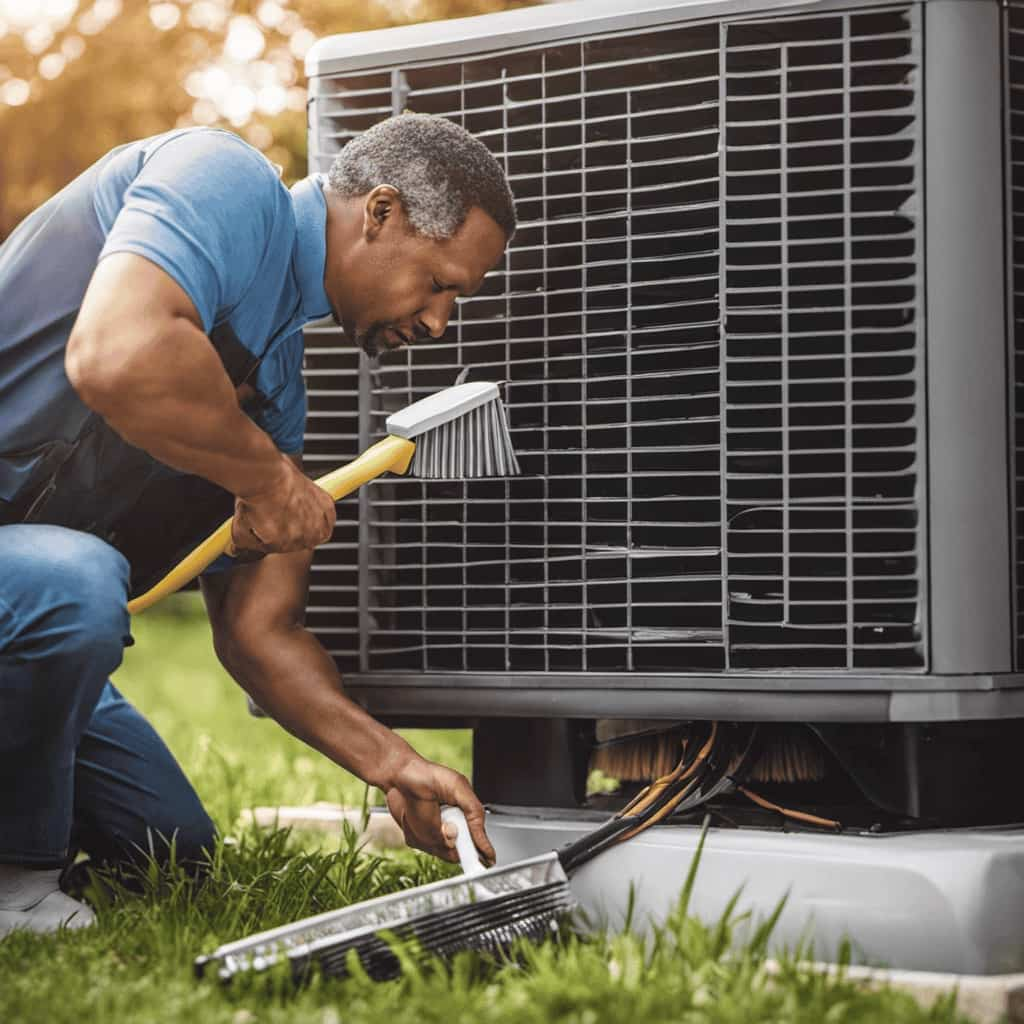
Feeling overwhelmed by the multitude of heat pump choices available? Fear not, we’re here to support you.
Choosing the best heat pump for climate control can be overwhelming, but fear not! In this article, we will be your guiding light, leading you through the technical aspects, evaluating your unique needs, and exploring the features that matter most.
So, grab a cup of coffee and join us as we dive into the world of heat pumps, helping you make an informed decision for your home.
Key Takeaways
- Understand the different types of heat pumps available, such as air-source, ground-source, and ductless mini-split, and consider their suitability for your specific needs.
- Evaluate the energy efficiency of heat pumps by comparing SEER and HSPF ratings, and prioritize higher ratings for greater energy savings.
- Consider climate suitability and heating/cooling needs when choosing a heat pump, taking into account factors like climate zone, load requirements, noise level, and maintenance.
- Research and compare different brands, considering factors like reputation, reliability, customer support, and cost, while also analyzing the potential long-term savings and environmental impact of the heat pump.
Understanding the Different Types of Heat Pumps
We’ll begin by discussing the different types of heat pumps.
When evaluating performance, it’s essential to understand the various options available on the market.
The first type is the air-source heat pump, which extracts heat from the outside air and transfers it inside your home. It’s a cost-effective option and works efficiently in moderate climates.
The second type is the ground-source heat pump, also known as a geothermal heat pump. This system uses the constant temperature of the ground to heat or cool your home. Although it has a higher upfront cost, it provides excellent energy efficiency and long-term savings.
Lastly, there’s the ductless mini-split heat pump, ideal for homes without existing ductwork. It offers flexibility in zoning and allows for independent temperature control in different areas.
When comparing prices, consider not only the initial cost but also the long-term energy savings and maintenance requirements.
Evaluating Your Climate and Heating/Cooling Needs
When it comes to evaluating our climate and heating/cooling needs, there are a few key points to consider.
First, we need to use a climate suitability checklist to determine if a heat pump is the right choice for our specific climate. This checklist takes into account factors such as temperature range, humidity levels, and annual heating and cooling requirements.
Second, we should prioritize efficient temperature control, as this will ensure that our heat pump is able to keep our home comfortable year-round while minimizing energy consumption.
Climate Suitability Checklist
Before selecting a heat pump, it’s important to assess our climate and heating/cooling requirements using a climate suitability checklist. This checklist can help us determine the most appropriate heat pump for our specific needs. Here are five items to consider:
- Climate zone: Determine which climate zone you reside in to understand the temperature ranges and weather conditions you’ll need to combat.
- Heating and cooling load: Calculate the size of your space and the amount of heating and cooling required to maintain a comfortable temperature.
- Energy efficiency: Look for heat pumps with high energy efficiency ratings to maximize climate control benefits while minimizing energy consumption.
- Noise level: Consider the noise tolerance in your home and choose a heat pump with a noise level that suits your preferences.
- Maintenance requirements: Assess the maintenance needs of different heat pump models and choose one that aligns with your schedule and capabilities.
By evaluating these factors, we can select a heat pump that suits our climate and heating/cooling needs efficiently.
Transitioning into the subsequent section about efficient temperature control, let’s explore how heat pumps can offer precise and effective temperature regulation.
Efficient Temperature Control
To ensure efficient temperature control, we frequently evaluate our climate and heating/cooling needs. By understanding our specific requirements, we can choose a heat pump that will provide optimal performance while saving energy.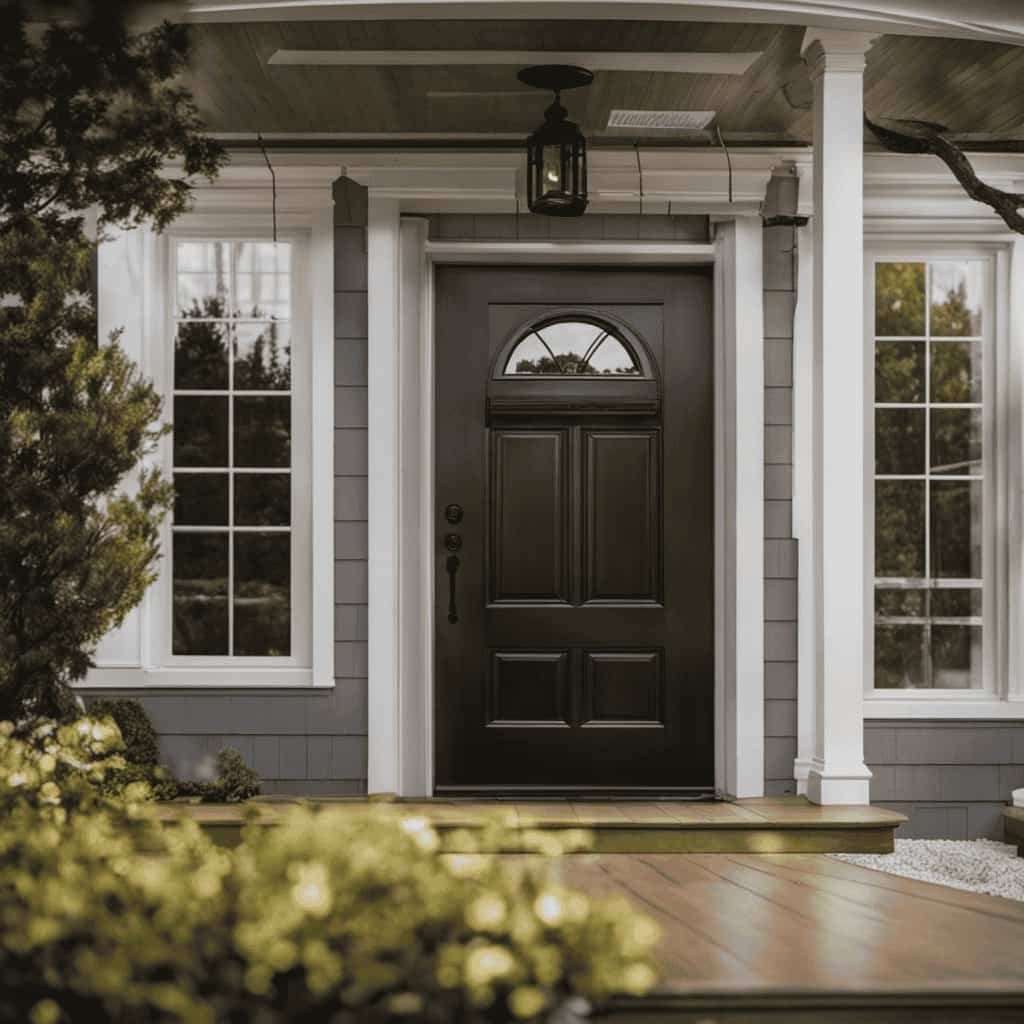
Efficient temperature control is achieved through the use of advanced technology that enables precise adjustments based on the current conditions. Energy saving technology, such as variable speed compressors and smart thermostats, allows the heat pump to adapt to changing temperatures and adjust its output accordingly. This not only ensures that the desired temperature is maintained consistently but also minimizes energy consumption.
By evaluating our climate and heating/cooling needs, we can select a heat pump that’s tailored to our requirements, providing efficient temperature control and reducing energy costs.
Now that we’ve discussed efficient temperature control, let’s move on to the next section about sizing your heat pump for optimal performance.
Sizing Your Heat Pump for Optimal Performance
We need to consider the size of our heat pump for optimal performance in climate control. Proper sizing ensures that the heat pump can efficiently heat or cool the desired space.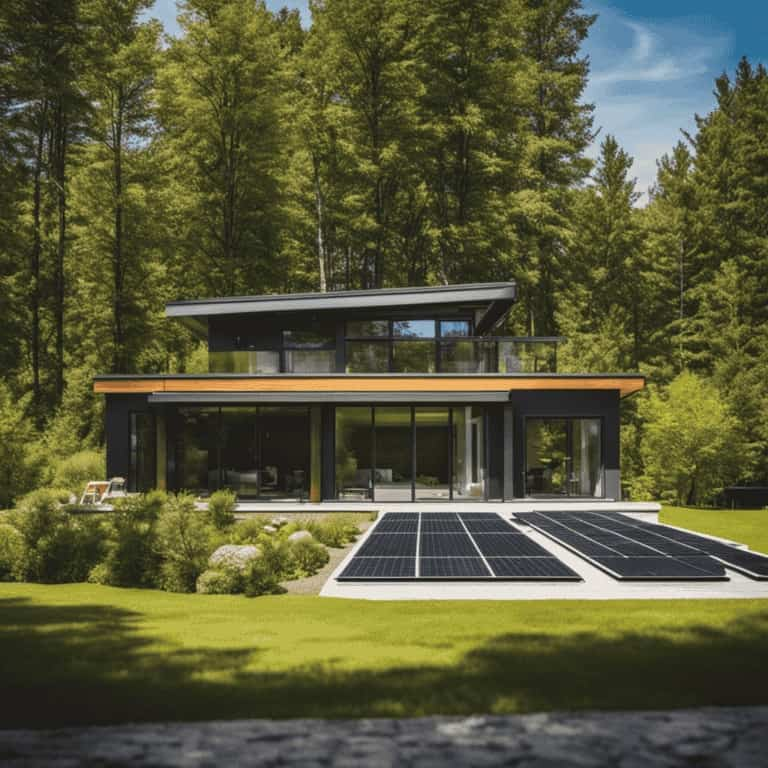
Here are some sizing considerations to keep in mind:
Calculate the heating and cooling loads: Determine the amount of heat that needs to be added or removed from the space. Factors such as insulation, windows, and occupancy levels affect the load calculation.
Consult a professional: Seek the expertise of a heating and cooling professional to accurately determine the appropriate size for your heat pump. They’ll consider factors like climate, square footage, and the layout of the space.
Avoid undersizing: An undersized heat pump will struggle to meet the heating or cooling demands, leading to decreased performance and increased energy consumption.

Avoid oversizing: An oversized heat pump may cycle on and off frequently, resulting in reduced efficiency, increased wear and tear, and inconsistent temperature control.
Consider future needs: Take into account any potential changes in the space, such as additions or renovations, to ensure your heat pump can handle future requirements.
Comparing Energy Efficiency Ratings
When comparing energy efficiency ratings, we should consider the Seasonal Energy Efficiency Ratio (SEER) and the Heating Seasonal Performance Factor (HSPF) of different heat pump models. SEER measures the cooling efficiency of a heat pump, while HSPF gauges its heating efficiency. Higher SEER and HSPF values indicate greater energy efficiency.
Evaluating cost effectiveness involves looking at the initial purchase price, as well as the long-term energy savings that a more efficient heat pump can provide. It’s important to compare the SEER and HSPF ratings of different models to determine their energy efficiency and potential savings.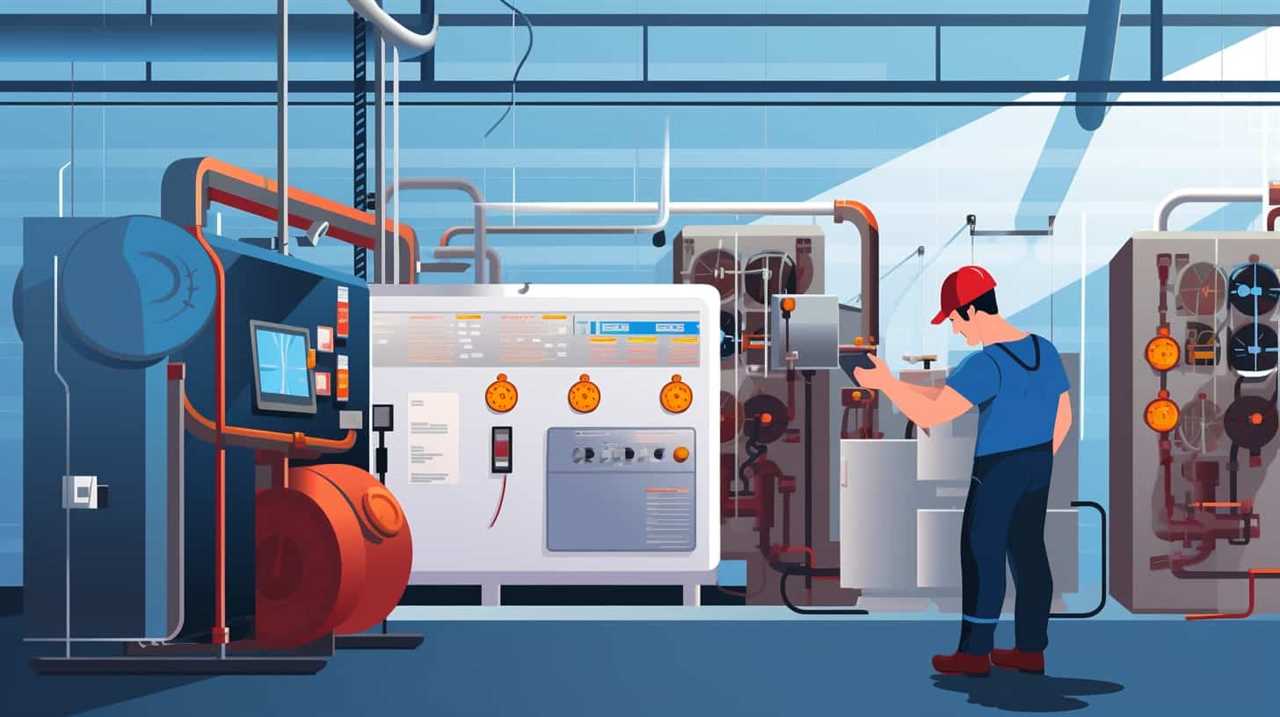
Additionally, comparing environmental impact is crucial. Energy-efficient heat pumps consume less energy, leading to reduced greenhouse gas emissions. By choosing a heat pump with higher SEER and HSPF ratings, we can contribute to a more sustainable future while saving on energy costs.
Exploring Additional Features and Technology
Our research found that the heat pump’s additional features and technology greatly enhance its performance. When exploring smart technology options, consider the following:
Wi-Fi connectivity: Some heat pumps can be connected to your home’s Wi-Fi network, allowing you to control and monitor your climate settings remotely through a mobile app.
Smart thermostats: Many heat pumps now come with built-in smart thermostats, which can learn your preferences and adjust the temperature accordingly, optimizing energy efficiency.
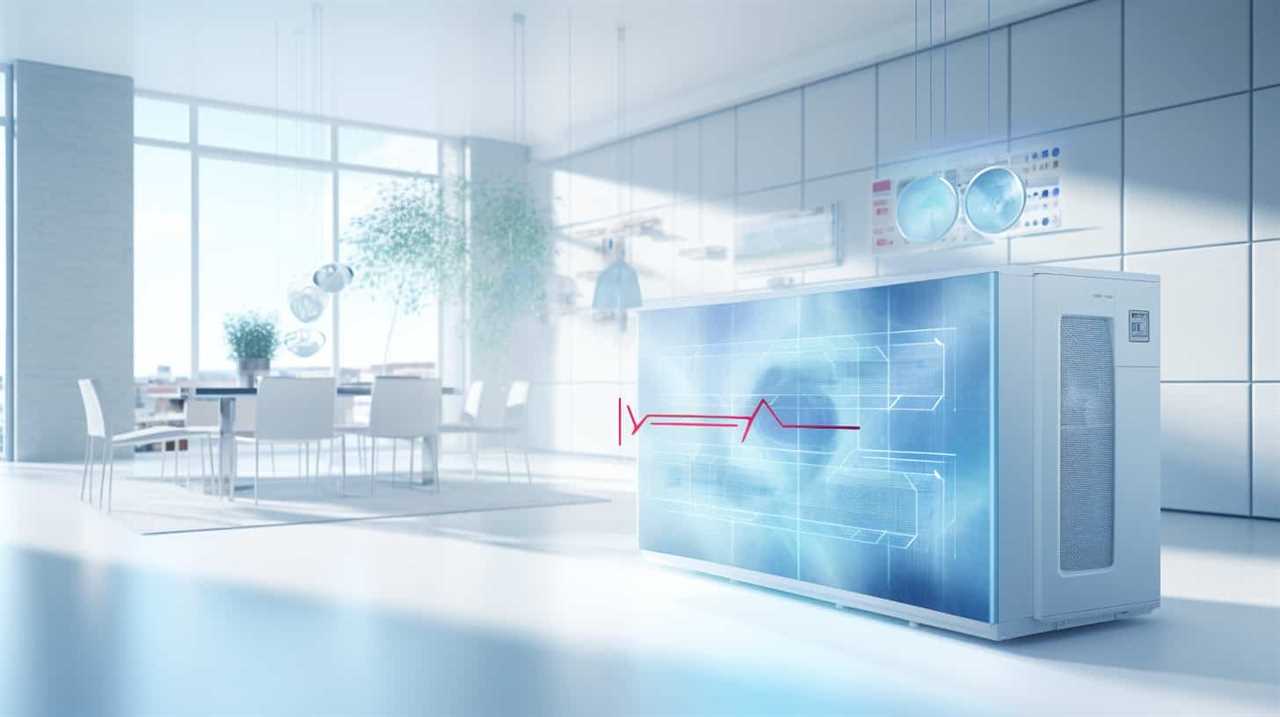
Variable-speed motors: Heat pumps equipped with variable-speed motors can adjust the speed of the compressor and fan, providing more precise temperature control and reducing energy consumption.
Dual fuel compatibility: Some heat pumps can be used in conjunction with a gas or oil furnace, allowing for seamless switching between different fuel sources based on efficiency and outdoor temperatures.
Environmentally friendly refrigerants: Consider heat pumps that use eco-friendly refrigerants, such as R-410A, which have lower greenhouse gas emissions and contribute to a more sustainable environment.
With these additional features and technology, you can enjoy greater control, energy efficiency, and eco-friendliness in your climate control system.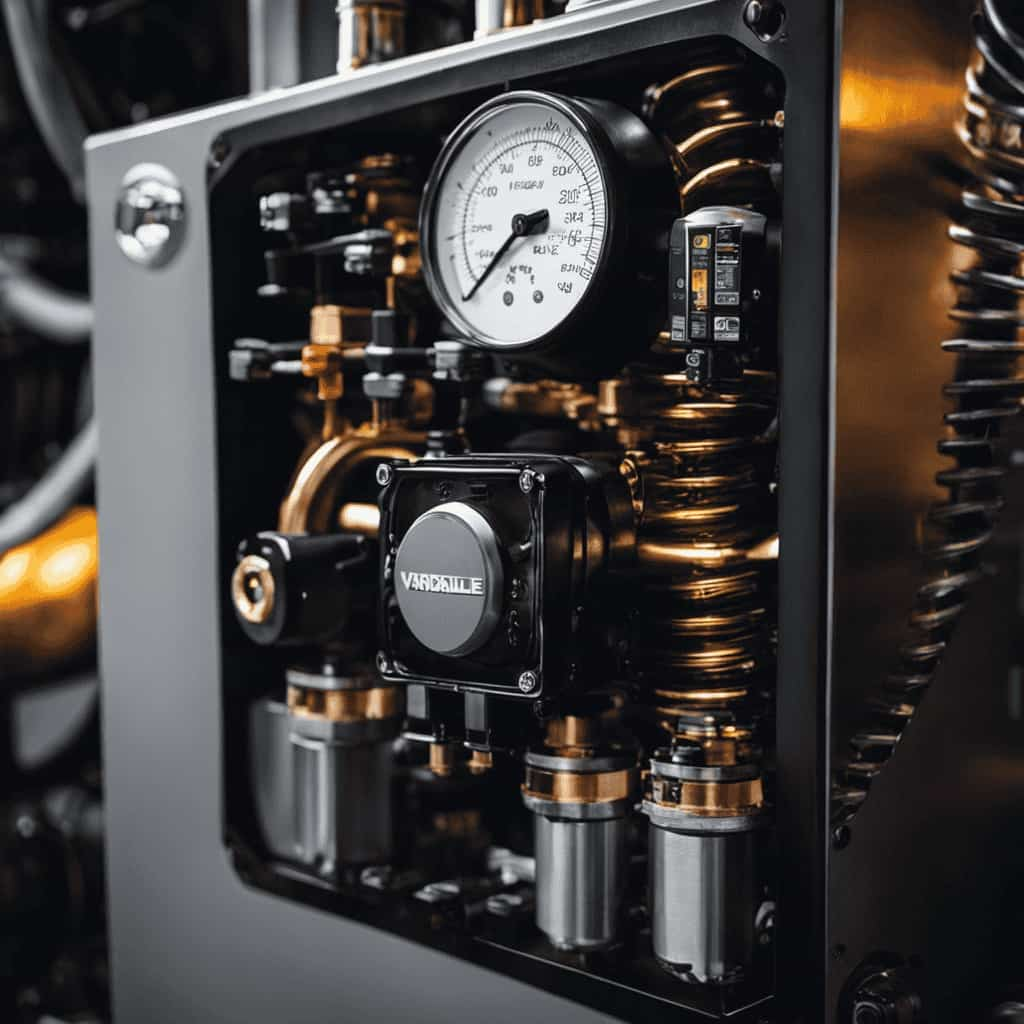
Now, let’s move on to the next section and consider the importance of noise levels and location when choosing a heat pump.
Considering Noise Levels and Location
During the selection process, it is important to take into account the noise levels and location of the heat pump. Noise reduction is a crucial factor to consider, as a quiet heat pump can prevent disturbances and ensure a peaceful environment. When evaluating noise levels, it is recommended to review the manufacturer’s specifications and look for units with lower decibel ratings. Additionally, location planning is essential to minimize noise impact. Placing the heat pump away from bedrooms or living areas can help reduce noise disruption. Consideration should also be given to the unit’s vibration levels and the potential for sound insulation. By carefully assessing noise levels and strategically planning the location of the heat pump, you can ensure optimal comfort without compromising tranquility.
| Noise Reduction | Location Planning |
|---|---|
| Review manufacturer’s specifications for noise levels | Place heat pump away from bedrooms or living areas |
| Look for units with lower decibel ratings | Consider vibration levels and potential for sound insulation |
Assessing Installation and Maintenance Requirements
To ensure optimal performance and longevity, we must carefully assess the installation and maintenance requirements of the heat pump. Here are some key factors to consider:
Assessing energy consumption: It’s crucial to evaluate the energy efficiency of the heat pump before installation. Look for models that have high Seasonal Energy Efficiency Ratio (SEER) and Heating Seasonal Performance Factor (HSPF) ratings, as these indicate better energy efficiency.
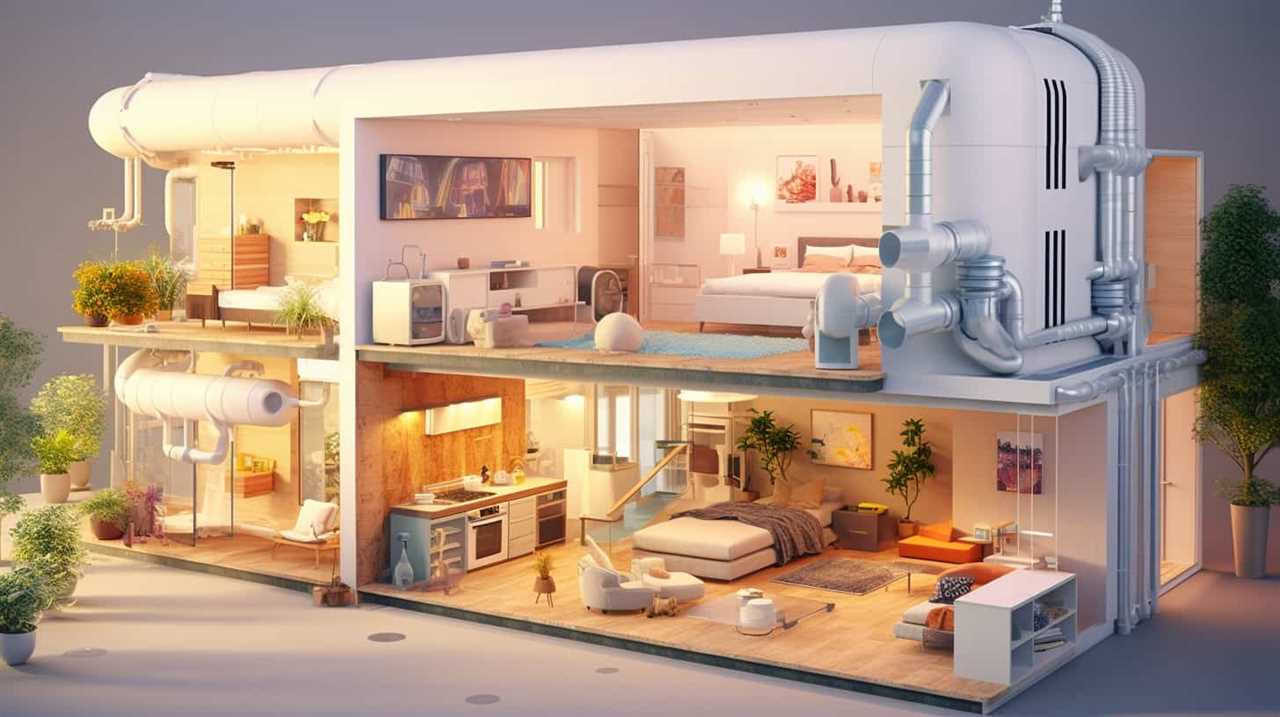
Understanding warranty policies: Familiarize yourself with the warranty policies offered by the manufacturer. Pay attention to the coverage period and what’s included in the warranty. This will help you understand the level of support and protection you can expect.
Proper installation: Hiring a professional HVAC technician for the installation ensures that the heat pump is set up correctly, preventing any potential issues and maximizing its performance.
Regular maintenance: Regular maintenance is essential for the heat pump’s longevity. This includes cleaning or replacing filters, inspecting and cleaning coils, lubricating moving parts, and checking refrigerant levels.
Timely repairs: Addressing any issues promptly and seeking professional repair services when needed can prevent further damage and ensure the heat pump operates efficiently for years to come.
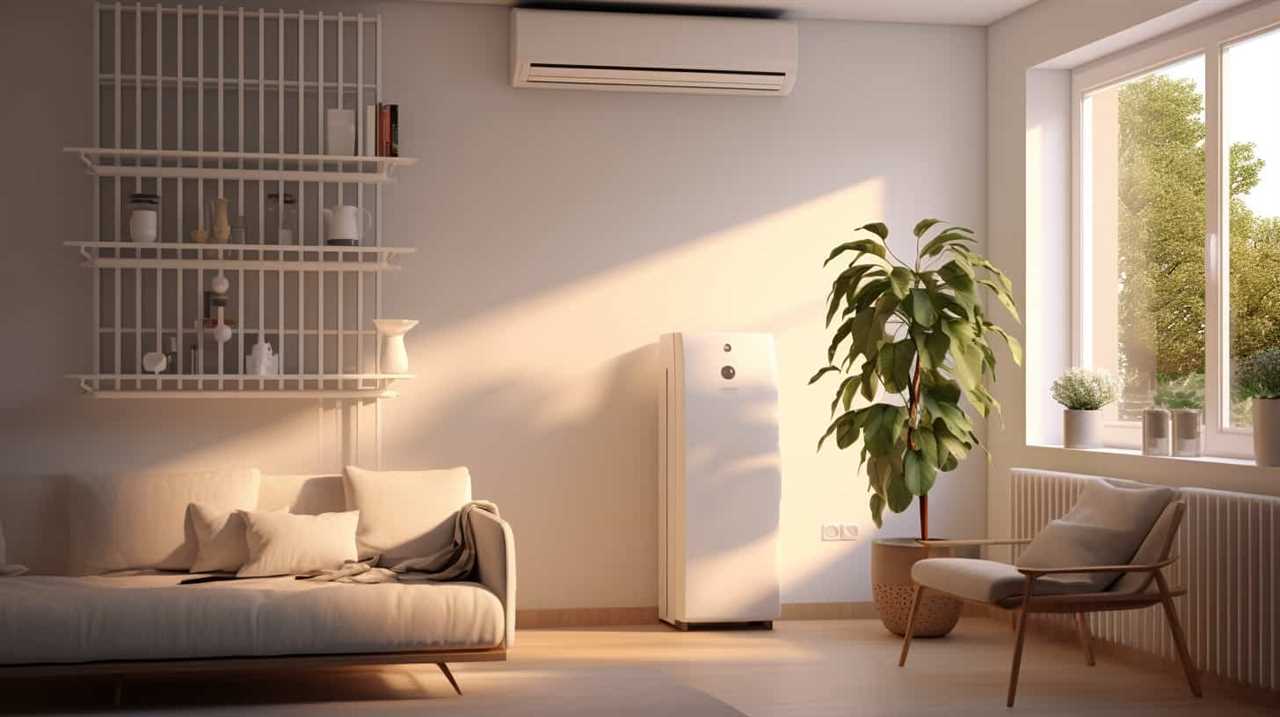
Understanding the installation and maintenance requirements of a heat pump is crucial for its optimal performance and longevity. Once you have assessed these factors, you can move on to the next step of researching brands and manufacturers.
Researching Brands and Manufacturers
Once we have assessed the installation and maintenance requirements, it is important to research brands and manufacturers to ensure we choose the best heat pump for climate control. When researching brands, it is crucial to consider factors such as reputation, reliability, and customer support. One effective way to gather information is by reading customer reviews online. These reviews provide valuable insights into the performance and satisfaction of previous buyers. Additionally, researching pricing can help us make an informed decision while staying within our budget. By comparing prices from different manufacturers, we can find the best value for our investment. To help you in your research, here is a table comparing three popular heat pump brands:
| Brand | Reputation | Customer Reviews |
|---|---|---|
| Brand A | Excellent | Positive |
| Brand B | Good | Mixed |
| Brand C | Average | Negative |
Determining Your Budget and Return on Investment
When considering the budget for a heat pump, it’s crucial to weigh the cost against the long-term savings.
Conducting a financial feasibility analysis can help determine the return on investment and make an informed decision.
Cost Vs. Long-Term Savings
We will analyze the cost and long-term savings of different heat pumps to determine our budget and return on investment. When considering the cost effectiveness of a heat pump, it’s important to look beyond the initial purchase price. Here are some key factors to consider:
Energy Efficiency: Look for heat pumps that have a high Seasonal Energy Efficiency Ratio (SEER) and Heating Seasonal Performance Factor (HSPF) ratings. Higher ratings indicate greater energy efficiency, which can lead to long-term savings on utility bills.
Maintenance and Repairs: Consider the cost of regular maintenance and potential repairs. Some heat pumps may require more frequent servicing or have higher repair costs, which can impact the overall cost effectiveness.
Lifespan: Longer lifespan heat pumps may have a higher upfront cost but can provide greater long-term savings by reducing the need for premature replacement.
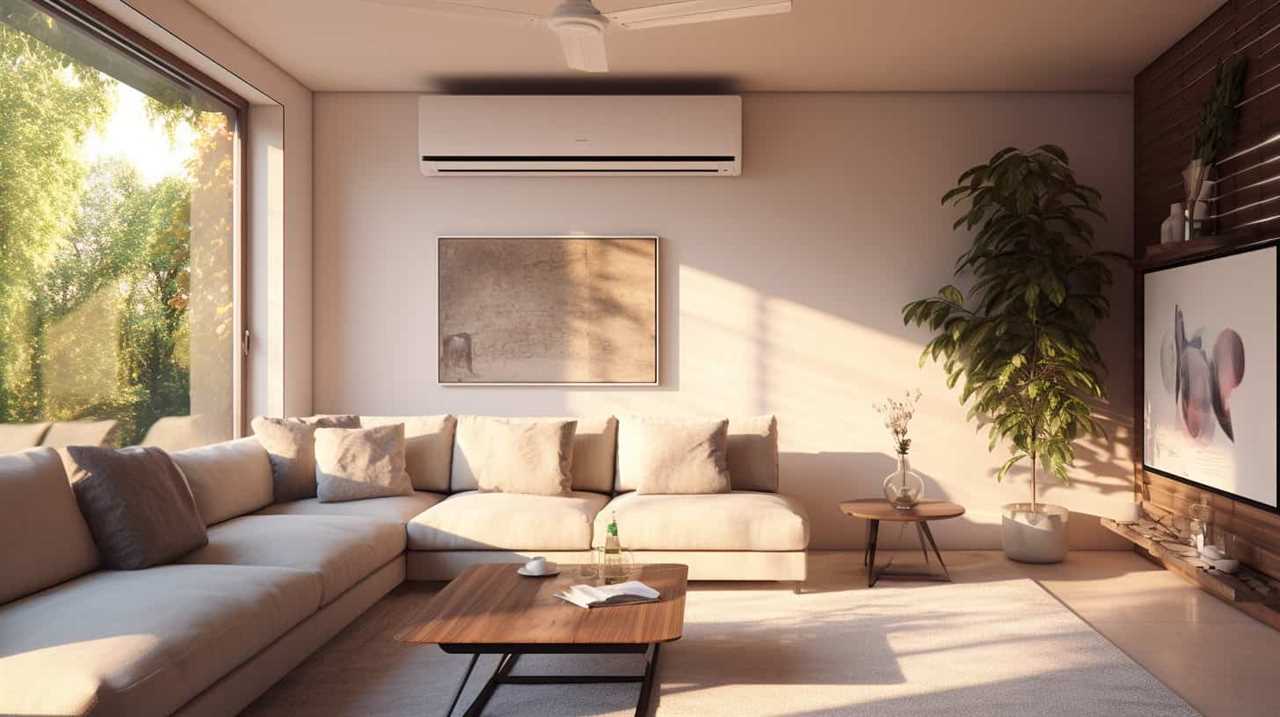
Environmental Impact: Evaluate the environmental impact of the heat pump. Opting for energy-efficient models that use eco-friendly refrigerants can contribute to a greener and more sustainable future.
Incentives and Rebates: Research any available incentives or rebates offered by utility companies or government programs. These can help offset the initial cost and improve the long-term return on investment.
Financial Feasibility Analysis
To determine our budget and return on investment, we need to conduct a financial feasibility analysis for choosing the best heat pump for climate control. This analysis involves a detailed financial assessment of the costs and benefits associated with different heat pump options.
The first step in the financial analysis is to determine the initial cost of purchasing and installing the heat pump. This includes the cost of the unit itself, as well as any additional expenses such as installation fees and necessary upgrades to the existing HVAC system.
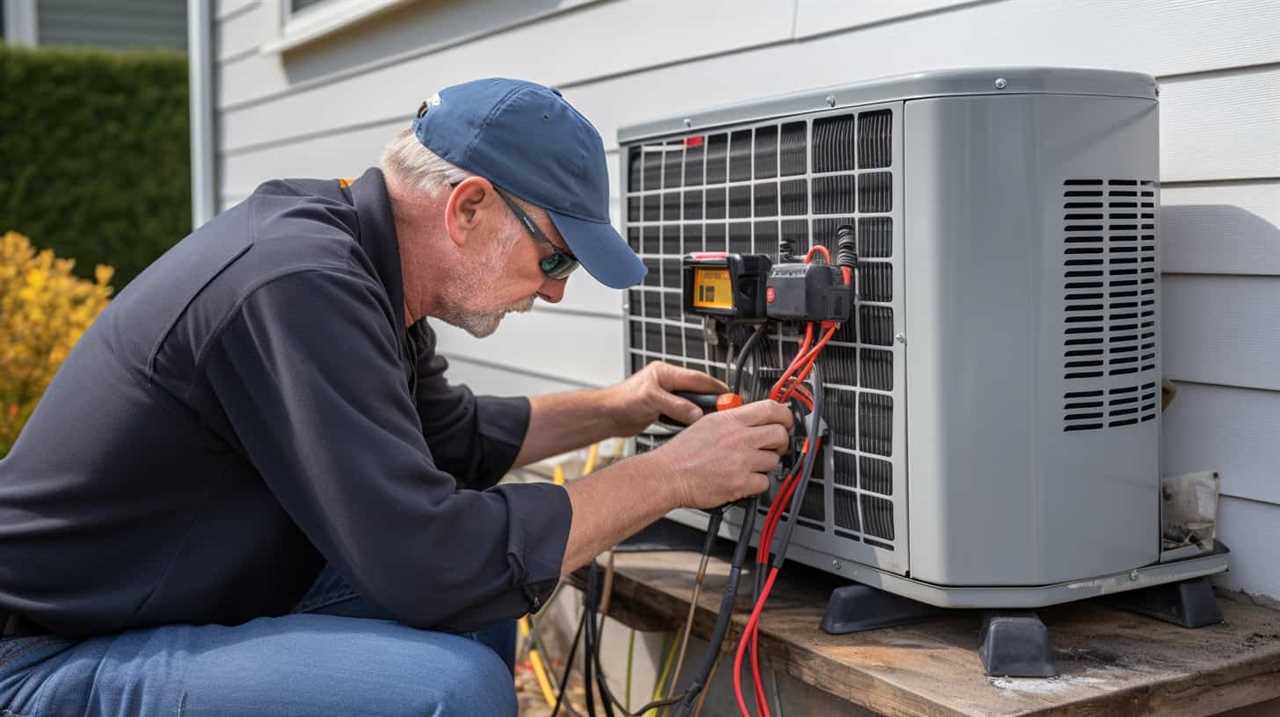
Next, we need to consider the long-term savings that can be achieved with each heat pump option. This involves calculating the potential energy savings over the lifespan of the unit, taking into account factors such as the efficiency of the heat pump and the local energy prices.
Once we’ve gathered all the necessary data, we can perform a cost-benefit analysis to determine the financial viability of each heat pump option. This analysis compares the initial costs with the long-term savings to assess the return on investment.
Frequently Asked Questions
How Long Does a Heat Pump Typically Last?
Heat pump lifespans can vary based on factors like maintenance and usage. Several elements affect longevity, such as proper installation and regular servicing. Understanding these factors can help maximize a heat pump’s lifespan.
Can a Heat Pump Be Used for Both Heating and Cooling?
Yes, a heat pump can be used for both heating and cooling. Despite concerns about efficiency, the benefits of using a heat pump for climate control far outweigh any potential drawbacks.
Are Heat Pumps Environmentally Friendly?
Heat pumps are environmentally friendly due to their high heat pump efficiency and low environmental impact. They can efficiently transfer heat from one location to another, reducing energy consumption and greenhouse gas emissions.
What Is the Average Cost of Installing a Heat Pump?
The average cost of installing a heat pump varies depending on the size and complexity of the system. The installation process involves assessing the site, selecting the appropriate unit, and ensuring proper electrical connections.
Can a Heat Pump Be Used in Extremely Cold Climates?
In extremely cold climates, heat pump efficiency may be reduced. However, some of the best heat pump brands offer models specifically designed for these conditions. These pumps utilize advanced technology to ensure optimal performance even in freezing temperatures.
What Factors Should I Consider When Choosing a Heat Pump for Climate Control?
When selecting the best heat pump for climate control, there are a few vital factors to consider. Firstly, the size of the space you wish to cool or heat, as this will determine the heat pump’s capacity. Secondly, energy efficiency ratings, such as the SEER and HSPF, should be examined to ensure optimal performance. Additionally, it’s crucial to assess the noise level and durability of the heat pump. Lastly, considering your specific climate and weather patterns can help determine if additional features like dehumidification or dual fuel capability are necessary for efficient climate control.
Conclusion
After carefully evaluating the different types of heat pumps, considering our climate and heating/cooling needs, and analyzing energy efficiency ratings, additional features, noise levels, and installation requirements, we’re confident in our ability to choose the best heat pump for climate control.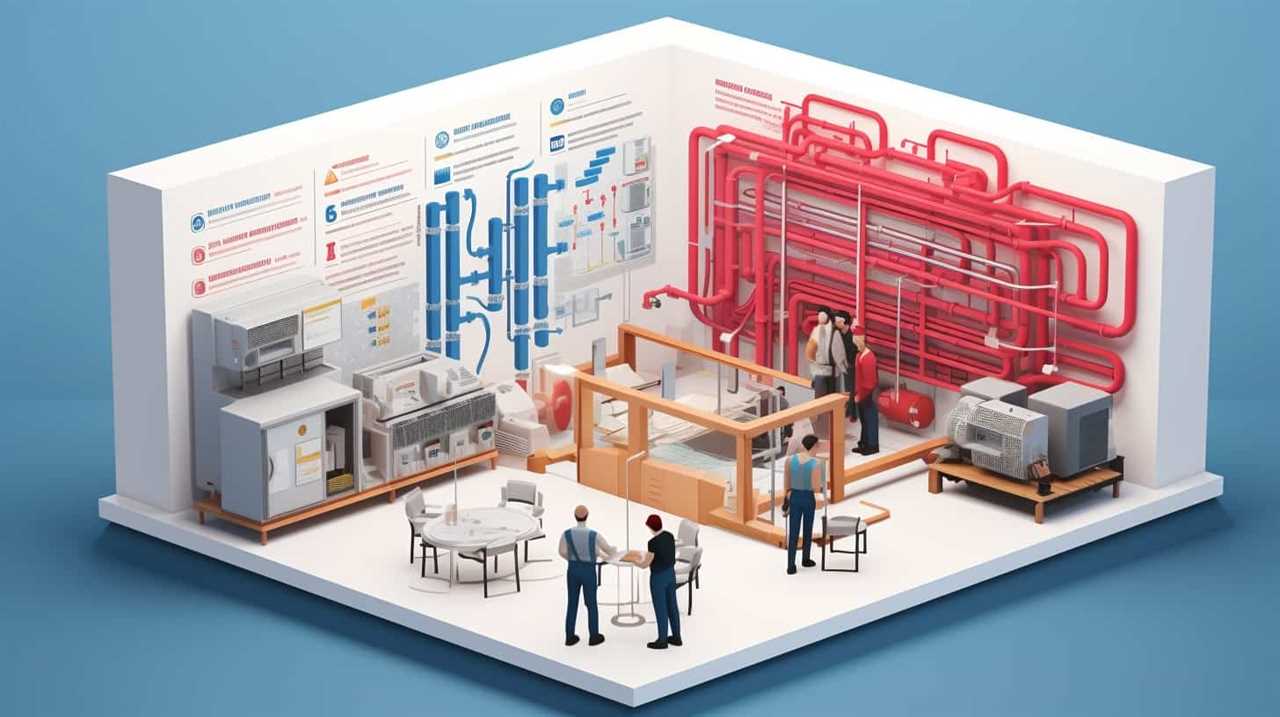
While some may argue that the cost and maintenance requirements of heat pumps can be high, the long-term energy savings and comfort provided make it a worthwhile investment for a more sustainable future.
Climate Control
8 Cutting-Edge High-Efficiency Heat Pumps for All Climates You Must Know About
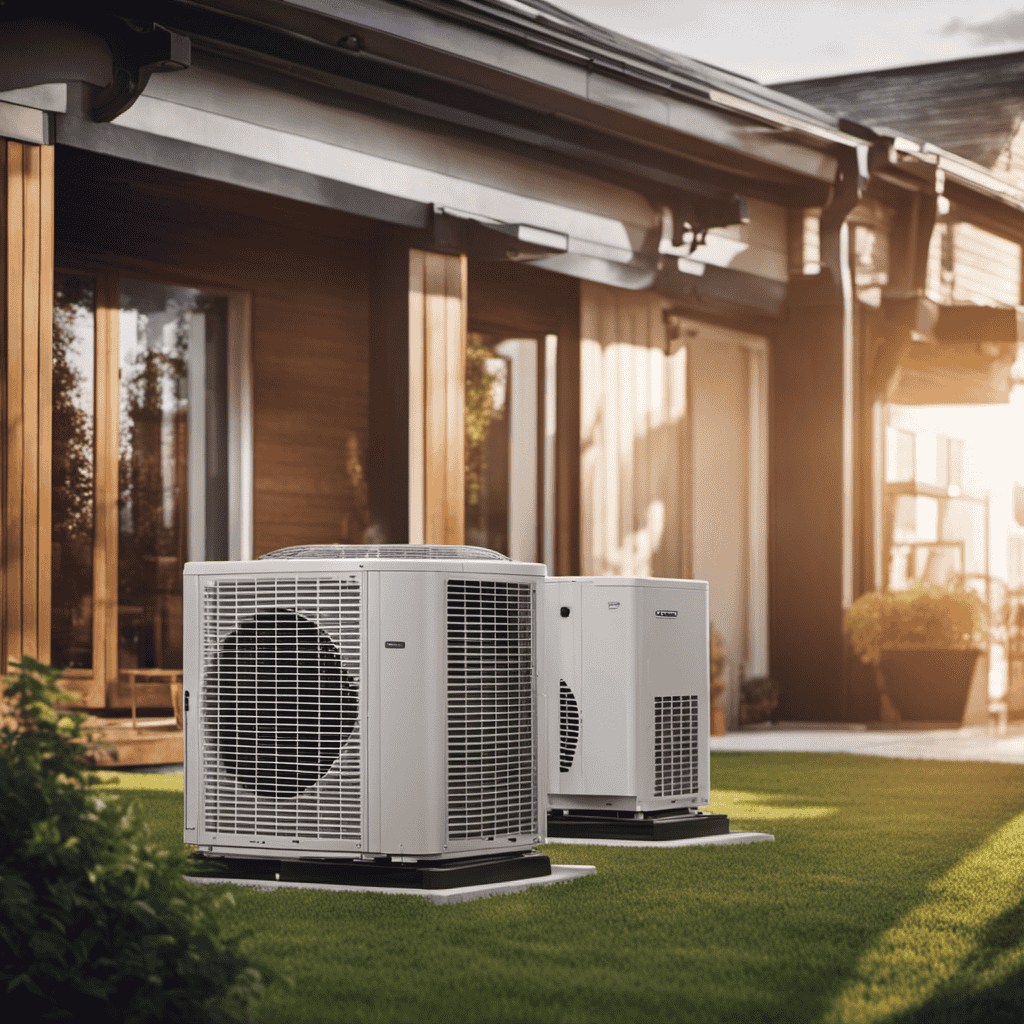
Are you fed up with cold winters and hot summers? Don’t worry, we have information on the newest and best heat pumps that will change the way you control your indoor climate.
From the super-efficient Heat Pump X to the all-weather wonder of Heat Pump Z, these cutting-edge machines will keep you comfortable in any climate. Say goodbye to sky-high energy bills and hello to the future of heating.
Get ready to be blown away by the power of heat pumps!
Key Takeaways
- Heat Pump X, Heat Pump Y, Heat Pump Z, Heat Pump A, and Heat Pump B offer high efficiency and sustainability.
- Assessing specific climate conditions is essential for determining optimal temperature settings for heat pumps.
- Heat Pump Y incorporates energy-saving technology and efficient operation to minimize energy consumption.
- Heat Pump B offers a cost-effective and environmentally friendly solution with significant energy savings and lower carbon emissions.
The Future of Heating: Introducing Heat Pump X
We can’t wait to tell you about the future of heating with our groundbreaking heat pump X. The advancements in heating technology have revolutionized the way we keep our homes warm and comfortable. Heat Pump X is a game-changer in the industry, offering unparalleled efficiency and sustainability.
This cutting-edge heat pump utilizes state-of-the-art technology to extract heat from the air or ground, transferring it into your home. It operates on a refrigeration cycle, absorbing heat from the outside environment and delivering it indoors. This process is highly energy-efficient, providing significant cost savings compared to traditional heating systems.
Heat Pump X is designed to work effectively in all climates, from frigid winters to scorching summers. It can efficiently heat your home during the colder months and cool it during the hotter months, offering year-round comfort. Its advanced controls allow for precise temperature adjustments, ensuring optimal comfort levels for you and your family.
Not only does Heat Pump X provide exceptional heating and cooling capabilities, but it’s also environmentally friendly. By utilizing renewable energy sources, it reduces greenhouse gas emissions and helps combat climate change. This makes it a perfect choice for individuals who desire to serve others by reducing their carbon footprint.
Unleashing Efficiency: The Power of Heat Pump Y
Heat Pump Y is a game-changer in terms of efficiency, offering optimal temperature control in all climates. Its energy-saving technology ensures efficient operation, reducing energy consumption and saving costs.
Not only is Heat Pump Y suitable for residential applications, but it also has versatile applications in commercial settings. This versatility makes it a highly adaptable and powerful heating solution.
Climate Compatibility: Optimal Temperatures
Achieving optimal temperatures is crucial for unleashing the efficiency of Heat Pump Y in different climates. By carefully selecting the optimal temperature settings, we can ensure that the heat pump operates at its highest efficiency, providing maximum comfort while minimizing energy consumption.
Here are three key considerations for determining the optimal temperature settings:
-
Climate impact assessment: It’s essential to assess the specific climate conditions of the location where the heat pump will be installed. Factors such as average temperatures, humidity levels, and seasonal variations play a significant role in determining the optimal temperature range.
-
Heat pump capacity: The size and capacity of the heat pump should align with the heating and cooling needs of the space. Oversized or undersized heat pumps can lead to inefficient operation and unnecessary energy consumption.
-
User preferences: Understanding the preferences and comfort requirements of the occupants is vital for setting the optimal temperature range. By considering factors such as desired indoor temperature, humidity levels, and personal preferences, the heat pump can be tailored to meet individual needs effectively.
Energy-Saving Technology: Efficient Operation
With the power of Heat Pump Y, we can maximize efficiency through its energy-saving technology and ensure its efficient operation in all climates.
Heat Pump Y incorporates an efficient design that allows for optimal energy conservation. Its advanced features and components work together to minimize energy consumption, resulting in significant cost savings for users.
The heat pump utilizes cutting-edge technology to extract heat from the air or ground and transfer it indoors for heating purposes. This process is carried out with minimal energy loss, ensuring maximum efficiency.
Heat Pump Y also employs smart control systems that continuously monitor and adjust performance to optimize energy usage. By prioritizing energy efficiency, Heat Pump Y provides a sustainable and environmentally friendly solution for heating and cooling needs.
Now, let’s explore the versatile applications of this high-efficiency heat pump in both residential and commercial settings.
Versatile Applications: Residential and Commercial
How can we utilize the power of Heat Pump Y in both residential and commercial settings to achieve maximum efficiency? Heat Pump Y offers versatile applications that make it suitable for both residential and commercial installations. Here are three ways in which Heat Pump Y can enhance residential and commercial efficiency:
-
Residential Installation: Heat Pump Y can be installed in homes to provide efficient heating and cooling solutions. Its high-efficiency performance ensures reduced energy consumption and lower utility bills for homeowners. Additionally, Heat Pump Y’s advanced technology allows for convenient temperature control and improved indoor air quality, creating a comfortable living environment.
-
Commercial Efficiency: In commercial settings such as offices, retail spaces, and hotels, Heat Pump Y can significantly improve energy efficiency. By using the heat pump’s heating and cooling capabilities, commercial buildings can reduce their reliance on traditional HVAC systems, leading to decreased energy usage and cost savings. Moreover, Heat Pump Y’s ability to provide consistent temperature regulation and precise climate control is beneficial for businesses that require optimal comfort for employees and customers.
-
Environmental Benefits: By utilizing Heat Pump Y in both residential and commercial settings, we can contribute to the reduction of greenhouse gas emissions. Heat pumps are known for their eco-friendly operation, as they extract heat from the air or ground instead of burning fossil fuels. This sustainable heating and cooling solution aligns with the goals of environmental conservation and promotes a greener future for our communities.
All-Weather Performance: Meet Heat Pump Z
We have found that Heat Pump Z offers exceptional all-weather performance in various climates. Its advanced technology optimizes performance, making it a reliable choice for achieving year-round comfort. Heat Pump Z is designed to operate efficiently in both hot and cold weather conditions, ensuring that you can enjoy a comfortable indoor environment regardless of the external temperature.
One of the key advancements of Heat Pump Z is its ability to adjust its performance based on the specific climate it’s operating in. This allows it to maximize efficiency and minimize energy consumption, ultimately saving you money on heating and cooling costs. Whether you live in a region with extreme heat or freezing temperatures, Heat Pump Z can adapt to provide optimal comfort without compromising on performance.
Furthermore, Heat Pump Z incorporates innovative features that enhance its all-weather capabilities. It has a defrost cycle that prevents ice buildup on the outdoor unit during cold weather, ensuring uninterrupted operation even in freezing conditions. Additionally, it utilizes a multi-stage compressor that adjusts its output based on the heating or cooling demands, resulting in precise temperature control and improved energy efficiency.
Revolutionary Technology: Exploring Heat Pump A
Let’s delve into the revolutionary technology behind Heat Pump A, which utilizes cutting-edge features to enhance its performance in various climates. This groundbreaking heat pump is designed to provide efficient and reliable heating and cooling, making it an ideal choice for residential and commercial applications.
Here are three key features that make Heat Pump A stand out:
-
Advanced Variable Speed Compressor: Heat Pump A incorporates an advanced variable speed compressor, which allows for precise control of heating and cooling output. This technology ensures that the heat pump operates at optimal efficiency, adjusting its speed to match the heating or cooling demand. This not only maximizes comfort but also saves energy and reduces utility costs.
-
Intelligent Defrosting System: Heat Pump A is equipped with an intelligent defrosting system that prevents ice buildup on the outdoor unit during cold weather. By automatically monitoring and adjusting defrost cycles, this system ensures efficient operation even in extremely low temperatures. This feature minimizes downtime and reduces the need for manual intervention, making Heat Pump A a reliable choice for all climates.
-
Enhanced Heat Exchange Technology: Heat Pump A utilizes enhanced heat exchange technology, which improves its heat transfer efficiency. This technology allows the heat pump to extract heat from the air or ground more effectively, resulting in higher heating capacities and improved overall performance.
Whether it’s exploring Heat Pump F or Heat Pump G, Heat Pump A is designed to provide exceptional heating and cooling performance in any climate.
Transitioning to the subsequent section, let’s now discover sustainable solutions with Heat Pump B, which offers innovative features for energy-efficient and environmentally friendly heating and cooling.
Sustainable Solutions: Discover Heat Pump B
Let’s talk about the cost-effectiveness and environmental benefits of Heat Pump B.
This cutting-edge technology offers a highly efficient solution for heating and cooling in all climates. With its advanced design and smart features, Heat Pump B can significantly reduce energy consumption and lower utility bills.
Moreover, it utilizes environmentally friendly refrigerants, minimizing its carbon footprint and contributing to a greener future.
Cost-effectiveness of Heat Pump B
The cost-effectiveness of Heat Pump B makes it a sustainable solution for all climates. Here are three reasons why:
-
Energy Saving Capabilities: Heat Pump B is designed with advanced technology that maximizes energy efficiency. It utilizes a two-stage compressor and variable-speed fan motor, allowing it to operate at different speeds depending on the heating or cooling demand. This results in significant energy savings compared to traditional heating and cooling systems.
-
Lower Operating Costs: Due to its high efficiency, Heat Pump B consumes less energy, which translates into lower monthly utility bills. Additionally, its smart thermostat feature enables users to program temperature settings, optimizing energy usage and further reducing costs.
-
Long-Term Savings: Although Heat Pump B may have a higher upfront cost compared to conventional systems, its energy-saving capabilities result in long-term savings. The reduced energy consumption and lower operating costs make Heat Pump B a cost-effective investment that pays off over time.
Environmental Benefits of Heat Pump B
We can’t ignore the positive impact that Heat Pump B has on the environment with its efficient energy usage and reduced carbon emissions. This heat pump not only provides effective heating and cooling solutions, but also contributes to a greener and more sustainable future. Let’s take a closer look at the environmental benefits of Heat Pump B.
| Environmental Benefits | Details |
|---|---|
| Reduced Energy Consumption | Heat Pump B is designed to operate with high efficiency, resulting in lower energy consumption compared to traditional heating and cooling systems. This not only reduces utility bills, but also decreases the overall demand for energy, leading to a reduced environmental impact. |
| Lower Carbon Emissions | By utilizing renewable energy sources, such as electricity, Heat Pump B significantly reduces carbon emissions. This helps combat climate change and improves air quality, making it a more eco-friendly choice. |
| Minimal Use of Fossil Fuels | Heat Pump B relies on electricity rather than fossil fuels, further reducing the dependency on non-renewable resources and decreasing the environmental footprint. |
| Reduced Noise Pollution | Heat Pump B operates quietly, minimizing noise pollution in residential and commercial areas. This improves the overall quality of life and contributes to a more peaceful environment. |
| Long Lifespan | Heat Pump B is built to last, resulting in less waste and environmental impact compared to systems that require frequent replacement. Its durability ensures a sustainable solution for many years to come. |
With its efficient energy usage, reduced carbon emissions, and other environmental benefits, Heat Pump B is a sustainable solution that not only serves our heating and cooling needs but also helps protect our planet for future generations.
Climate-Adaptive Innovation: Introducing Heat Pump C
While heat pumps A and B have already made significant advancements in climate-adaptive innovation, it’s time to introduce heat pump C as the latest cutting-edge solution for all climates.
Here are three reasons why heat pump C stands out as a climate-adaptive innovation:
-
Enhanced Efficiency: Heat pump C utilizes advanced technology to maximize energy efficiency, resulting in significant energy savings. Its intelligent control system adjusts the heating and cooling output based on the specific climate conditions, ensuring optimal performance in any environment. By reducing energy consumption, heat pump C contributes to climate change adaptation by minimizing greenhouse gas emissions.
-
Wide Temperature Range: Unlike traditional heat pumps that struggle in extreme climates, heat pump C is designed to operate efficiently in a wide temperature range. Whether it’s scorching heat or freezing cold, heat pump C maintains exceptional performance, providing consistent comfort throughout the year. This adaptability ensures that households and businesses can rely on heat pump C as a reliable heating and cooling solution, regardless of their location.
-
Smart Integration: Heat pump C incorporates smart technology and can be seamlessly integrated into existing home automation systems. This allows users to control and monitor their heating and cooling settings remotely, optimizing energy usage and ensuring a comfortable indoor environment. By embracing this level of connectivity, heat pump C enhances convenience and empowers individuals to make sustainable choices.
Heat pump C represents a significant step forward in climate-adaptive innovation. Its energy-efficient solutions, adaptability to various climates, and smart integration capabilities make it an excellent choice for individuals and businesses looking to reduce their environmental impact while enjoying optimal comfort.
Cutting-Edge Efficiency: Unveiling Heat Pump D
With its groundbreaking technology and exceptional performance, heat pump D sets a new standard for cutting-edge efficiency in all climates. This advanced heat pump is designed to maximize efficiency in buildings, providing both heating and cooling capabilities while minimizing energy consumption.
One of the most impressive features of heat pump D is its ability to adapt to various climate conditions. Whether it’s a scorching summer or a freezing winter, this heat pump can maintain optimal performance, ensuring comfort and energy savings all year round.
To better understand the advanced features of heat pump D, let’s take a look at the table below:
| Features | Description | Benefits |
|---|---|---|
| Intelligent Control | Automatically adjusts settings based on weather data | Optimizes energy consumption and reduces costs |
| Variable Speed Compressor | Adjusts compressor speed according to load requirements | Increases efficiency and reduces wear and tear |
| Dual Fuel Capability | Can automatically switch between gas and electric heating | Provides flexibility and cost savings |
| Smart Defrost System | Prevents ice buildup and ensures efficient operation | Improves performance and reduces maintenance needs |
| Energy Monitoring | Provides real-time energy usage information | Helps users track and optimize energy consumption |
With these advanced features, heat pump D not only delivers exceptional efficiency but also allows users to take control of their energy usage. By maximizing efficiency in buildings, this heat pump contributes to a more sustainable and comfortable future.
Next-Level Heating: Get to Know Heat Pump E
Heat Pump E offers advanced heating capabilities that are unmatched in the industry. With its next-gen heat pump technology, it brings numerous benefits to both residential and commercial settings. Here are three key reasons why Heat Pump E is a game-changer:
-
Superior Efficiency: Heat Pump E utilizes cutting-edge technology to deliver exceptional heating performance. Its innovative design maximizes energy efficiency, allowing for significant cost savings on heating bills. With its high coefficient of performance (COP), Heat Pump E can provide more heat output for every unit of electricity consumed, making it an environmentally friendly choice.
-
Wide Temperature Range: Unlike traditional heat pumps that struggle in extreme cold climates, Heat Pump E excels in all weather conditions. It can maintain its heating capacity even in sub-zero temperatures, ensuring a comfortable indoor environment year-round. Whether you live in a cold northern region or a mild southern climate, Heat Pump E will keep you warm efficiently.
-
Smart and Convenient Features: Heat Pump E is equipped with smart technology that enhances user experience. It offers intuitive controls and programmable settings, allowing users to easily customize their heating preferences. Additionally, Heat Pump E can be integrated with home automation systems, enabling remote control and energy management. Its advanced diagnostic capabilities also ensure quick and accurate troubleshooting, minimizing downtime.
With its next-gen technology and an array of benefits, Heat Pump E is a top choice for those seeking efficient, reliable, and convenient heating solutions.
Frequently Asked Questions
How Much Does Heat Pump X Cost?
When considering the cost of heat pump X, it’s important to take into account the benefits it offers in terms of energy savings.
Our team has conducted a cost comparison analysis and found that heat pump X provides significant energy savings compared to other models on the market.
While the exact cost of heat pump X may vary depending on factors such as installation and location, the long-term energy savings make it a worthwhile investment.
Are There Any Government Incentives or Rebates Available for Purchasing Heat Pump Y?
Yes, there are government incentives and rebates available for purchasing heat pump y. These incentives are designed to promote energy savings and encourage individuals to adopt more efficient heating technologies.
By taking advantage of these incentives, homeowners can reduce the upfront cost of purchasing a high-efficiency heat pump and enjoy long-term energy savings.
These government programs provide a valuable opportunity for individuals to contribute to a greener and more sustainable future.
What Is the Warranty Period for Heat Pump Z?
The warranty coverage for heat pump z is an important consideration when purchasing a high-efficiency heat pump.
It’s crucial to understand the length of the warranty period and what it covers.
Additionally, it’s essential to be aware of the maintenance requirements to ensure the warranty remains valid.
Can Heat Pump a Be Used as a Standalone Heating System or Does It Require Additional Equipment?
Heat pump A can indeed be used as a standalone heating system without the need for additional equipment. Its cutting-edge technology allows it to efficiently heat your space regardless of the climate.
This high-efficiency heat pump is designed to provide optimal comfort and savings without the hassle of complicated installations or supplementary devices. With heat pump A, you can enjoy a reliable and effective heating solution that meets your needs without any added complications.
Is Heat Pump B Compatible With Smart Home Systems for Remote Control and Monitoring?
Yes, heat pump b is compatible with smart home systems for remote control and monitoring.
The integration of heat pump b with home automation allows for seamless control and monitoring of the system from anywhere.
This offers numerous benefits, such as the ability to adjust temperature settings remotely, optimize energy usage, and receive real-time alerts and notifications.
With heat pump b remote control, users can enjoy enhanced convenience, comfort, and energy efficiency in their homes.
Can These High-Efficiency Heat Pumps Help Test the Energy Efficiency of My Current Heat Pumps?
Can these high-efficiency heat pumps help test the energy efficiency of my current heat pumps? If you’re looking to optimize your heating system, considering heat pump energy efficiency tips is essential. High-efficiency heat pumps can provide a benchmark to evaluate your current system’s efficiency. By assessing their performance and comparing it to your current setup, you can identify potential upgrades or improvements for better energy efficiency.
Conclusion
In the ever-evolving world of heating technology, these cutting-edge high-efficiency heat pumps have emerged as game-changers.
From the revolutionary Heat Pump A to the climate-adaptive Heat Pump C, these innovative solutions are reshaping the way we heat our homes.
With their all-weather performance and sustainable features, such as the eco-friendly Heat Pump B, these pumps are paving the way towards a greener and more efficient future.
Embrace the next-level heating experience with Heat Pump E and unlock the power of comfort and energy savings.
Climate Control
Unveiling the Efficiency Secrets of HVAC Heat Pumps

Prepare to discover the hidden treasures of HVAC heat pumps! In this article, we, your reliable experts, will unveil the efficiency tips that will transform your heating and cooling system.
By exploring the crucial role of proper insulation, optimizing airflow, selecting the right size, and maintaining your heat pump, we will empower you with the knowledge to achieve maximum efficiency.
Get ready to liberate your HVAC system and embrace a new era of comfort and cost savings.
Key Takeaways
- Proper insulation and weatherization are essential for maximizing HVAC heat pump efficiency.
- Regular maintenance, including filter cleaning and coil inspection, ensures optimal performance and longevity.
- Correctly sized and designed ductwork is crucial for balanced airflow and efficient operation.
- Advanced technologies such as smart controls and variable speed compressors can enhance heat pump efficiency and performance.
The Role of Proper Insulation in HVAC Heat Pump Efficiency
Why is proper insulation important for maximizing the efficiency of our HVAC heat pumps?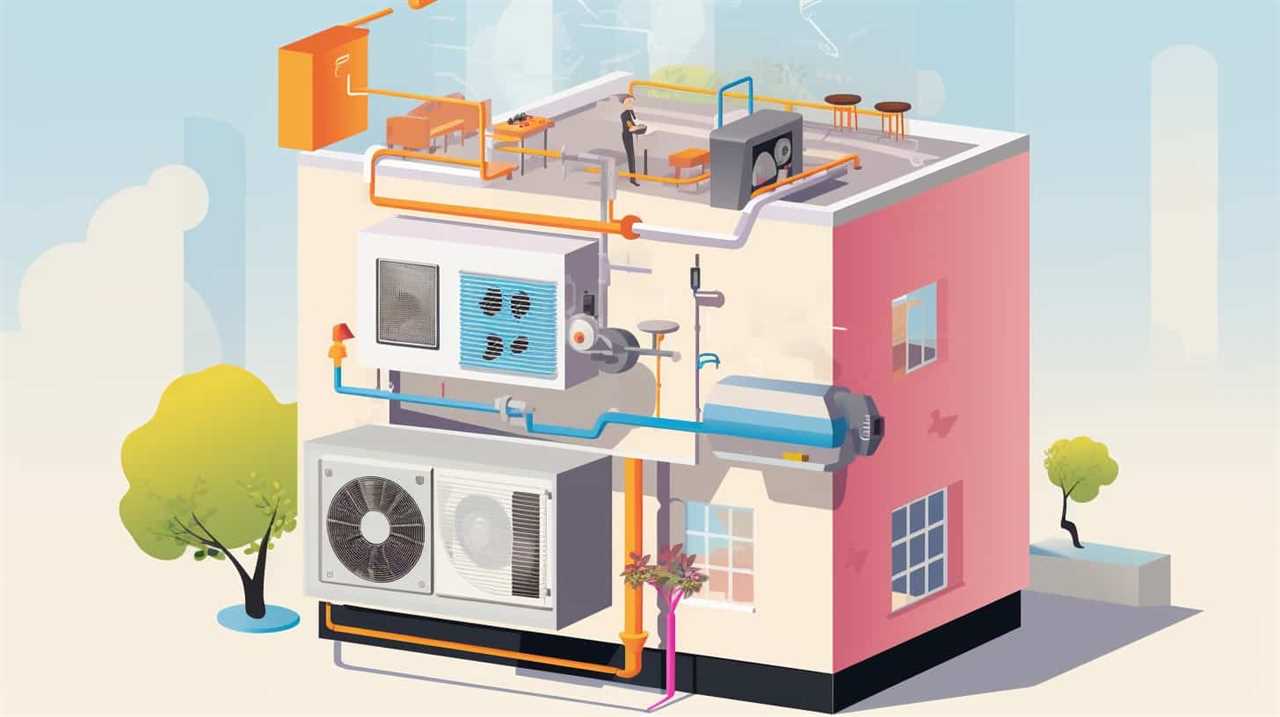
The role of weatherization in HVAC heat pump efficiency can’t be overstated. Proper insulation plays a crucial role in maintaining the desired indoor temperature while minimizing energy loss. Without adequate insulation, heat pumps must work harder to compensate for the escaped heat or cool air, resulting in reduced efficiency and increased energy consumption.
Additionally, the impact of ductwork on heat pump performance shouldn’t be overlooked. Leaky or poorly insulated ducts can lead to significant energy losses, compromising the overall efficiency of the system.
Optimizing Airflow for Enhanced HVAC Heat Pump Performance
To maximize the performance of our HVAC heat pumps, we need to optimize airflow for enhanced efficiency. Proper airflow management is crucial in achieving optimal heat pump operation and energy utilization. Here are three key strategies for heat pump optimization through airflow management:
Duct design and sizing: Ensure that the ductwork is correctly sized and designed to deliver the required airflow to each room. Improperly sized ducts can lead to air pressure imbalances and reduced system performance.
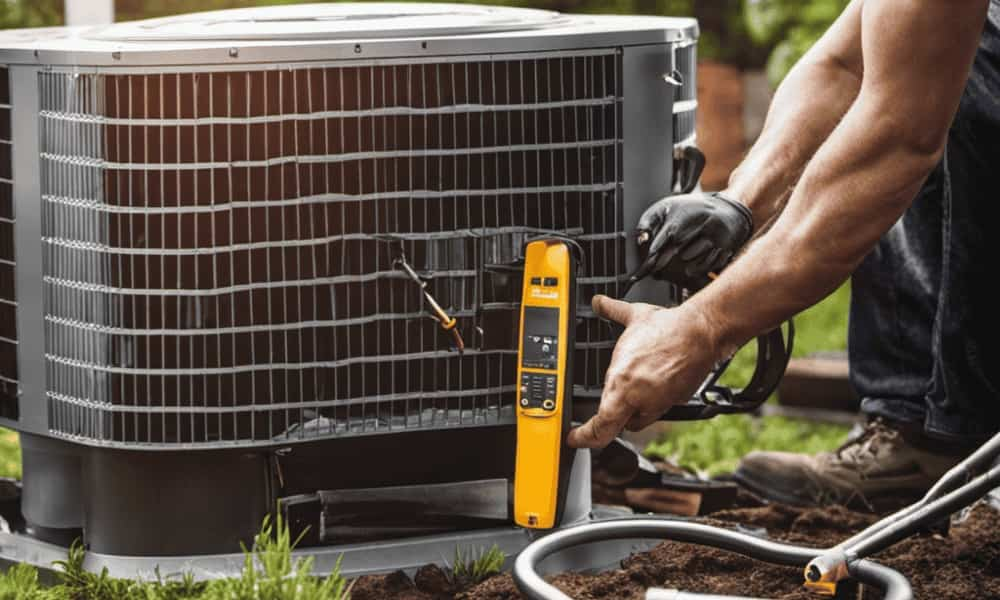
Regular filter maintenance: Clean or replace air filters regularly to prevent clogging and airflow restrictions. Restricted airflow can strain the heat pump, leading to decreased efficiency and increased energy consumption.
Airflow balancing: Balance the supply and return airflow throughout the system to maintain proper air distribution. Uneven airflow can result in hot or cold spots, reducing comfort and wasting energy.
Selecting the Right Size Heat Pump for Maximum Efficiency
We need to ensure that we select the right size heat pump for maximum efficiency. Sizing considerations play a crucial role in determining the energy consumption and overall performance of a heat pump.
Oversized heat pumps may lead to short cycling, where the unit turns on and off frequently, resulting in higher energy consumption and reduced efficiency.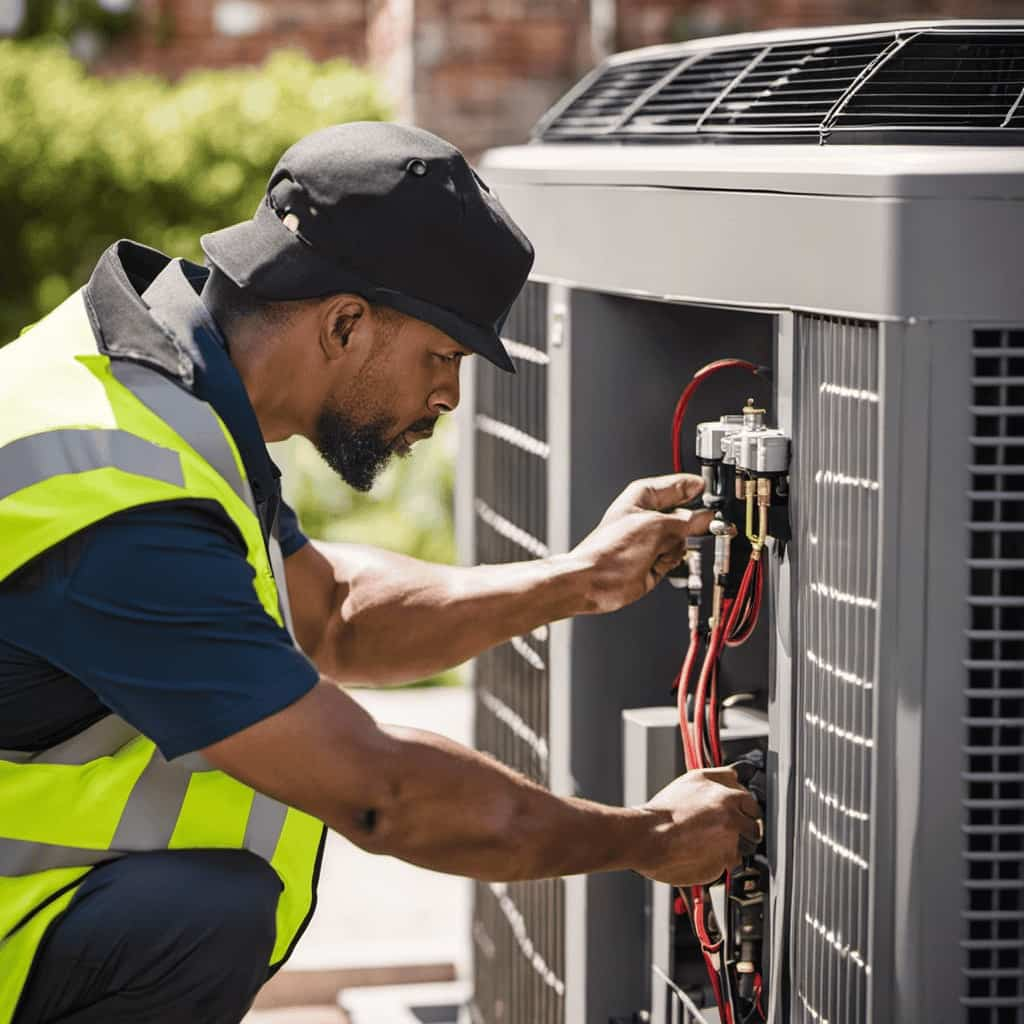
On the other hand, undersized heat pumps may struggle to meet the heating or cooling demands of the space, leading to increased energy usage and discomfort.
To select the right size heat pump, it’s important to consider factors such as the size and insulation of the space, climate conditions, and the heat pump’s heating and cooling capacity.
Conducting a thorough load calculation is essential to accurately determine the appropriate size of the heat pump for optimal efficiency.
The Importance of Regular HVAC Heat Pump Maintenance
Regular HVAC heat pump maintenance is essential for optimal performance and longevity. To ensure your heat pump operates at its best, it’s important to follow a regular maintenance checklist:

Cleaning the Filters: Dirty filters can restrict airflow and reduce efficiency. Regularly clean or replace filters to maintain optimal airflow.
Inspecting and Cleaning the Coils: Over time, coils can accumulate dirt and debris, hindering heat transfer. Regularly inspect and clean the coils to improve efficiency.
Checking Refrigerant Levels: Proper refrigerant levels are crucial for the heat pump’s performance. Regularly check and adjust refrigerant levels as needed.
By following these maintenance tasks, you can keep your heat pump operating efficiently and extend its lifespan.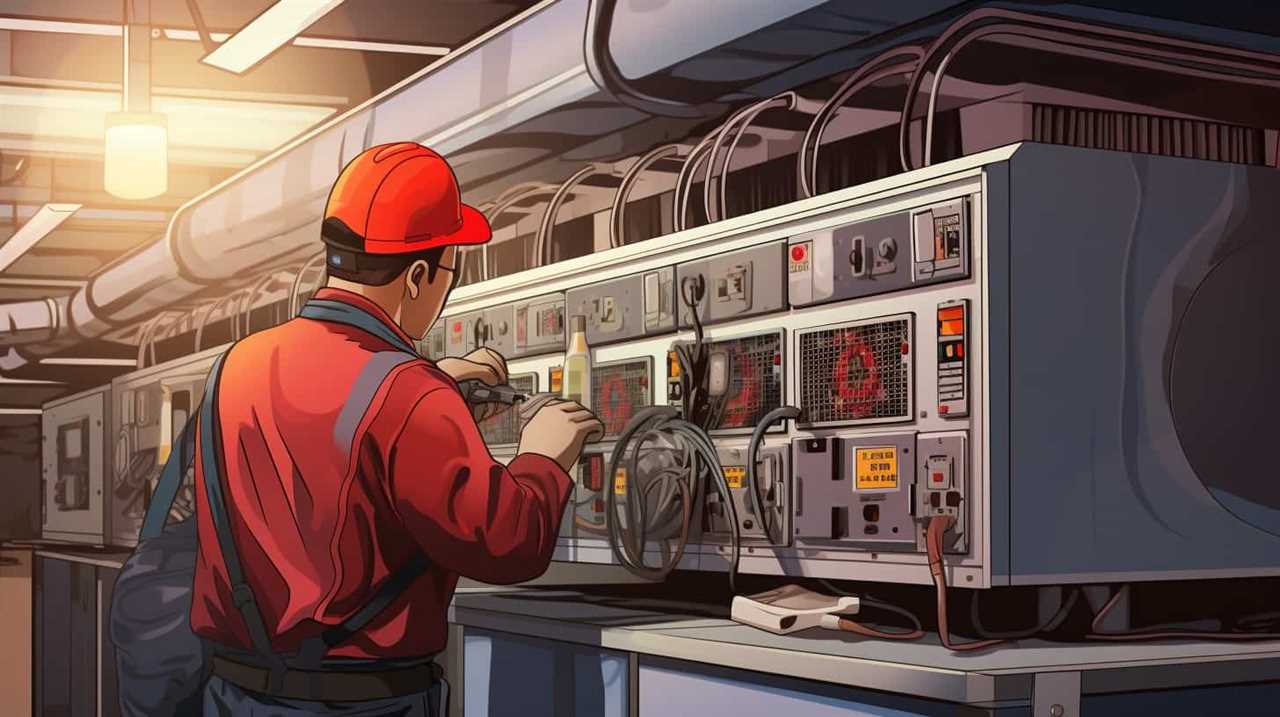
Now, let’s explore the advanced technologies for boosting HVAC heat pump efficiency.
Transition Sentence: Now that we understand the importance of regular maintenance, let’s delve into the advanced technologies that can further enhance the efficiency of HVAC heat pumps.
Advanced Technologies for Boosting HVAC Heat Pump Efficiency
Now, let’s explore how advanced technologies can enhance the efficiency of HVAC heat pumps.
One of the key advancements in boosting efficiency is the use of smart controls. These innovative systems utilize advanced algorithms and sensors to optimize the operation of heat pumps based on real-time conditions. By continuously monitoring factors such as indoor and outdoor temperatures, occupancy, and weather forecasts, smart controls can adjust the heat pump’s settings to maximize efficiency without sacrificing comfort.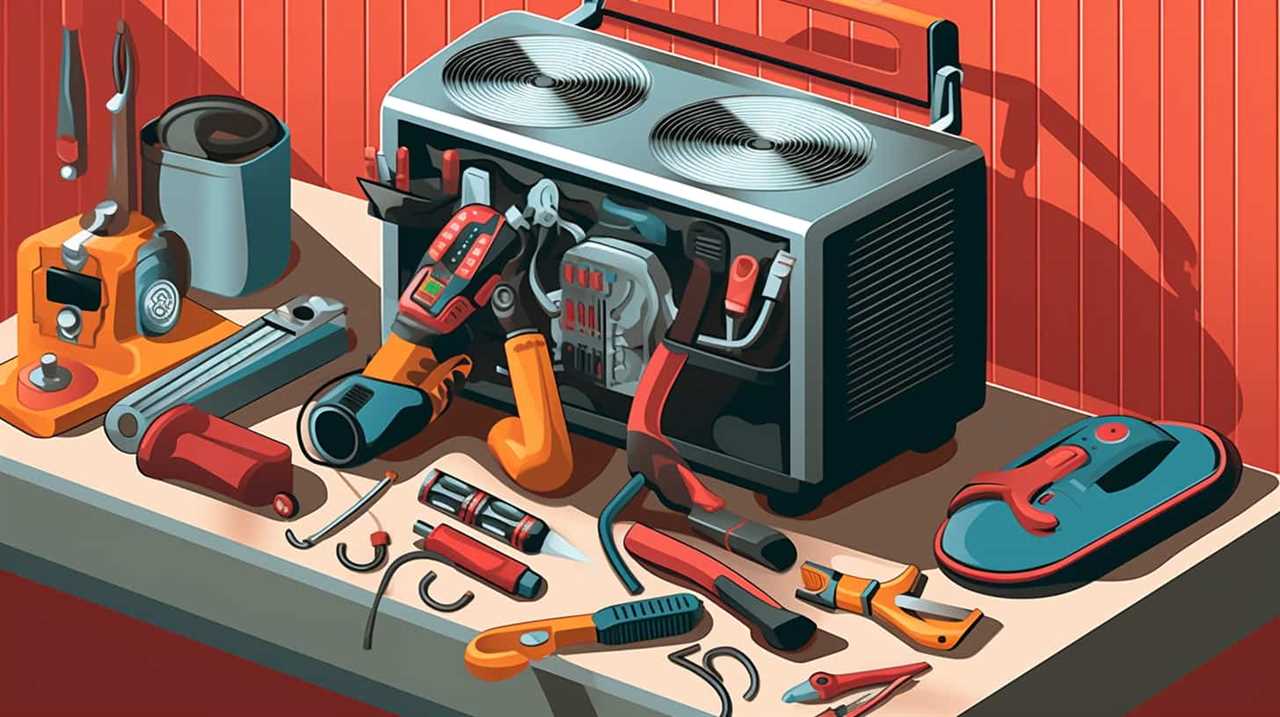
Another technology that can significantly improve HVAC heat pump efficiency is geothermal systems. These systems harness the stable underground temperature to provide heating and cooling, reducing the energy consumption of the heat pump. Geothermal systems also have the added benefit of being environmentally friendly, as they produce fewer greenhouse gas emissions compared to traditional HVAC systems.
Frequently Asked Questions
Can I Install an HVAC Heat Pump Without Proper Insulation and Still Expect It to Operate Efficiently?
Installing an HVAC heat pump without proper insulation can significantly impact its efficiency. Improper insulation can lead to energy consumption, airflow optimization, and size selection issues. Regular maintenance and the use of advanced technologies can enhance efficiency.
How Can I Improve the Airflow in My HVAC Heat Pump System to Enhance Its Performance?
To enhance our HVAC heat pump system’s performance, we must optimize fan speed and improve air circulation. These steps are crucial in achieving maximum efficiency and ensuring the liberation of our system’s full potential.
What Factors Should I Consider When Selecting the Right Size Heat Pump for My Home to Ensure Maximum Efficiency?
When selecting the right size heat pump for our home, we must consider factors like the square footage, insulation, and climate. Ensuring maximum efficiency requires finding the balance between capacity and energy consumption.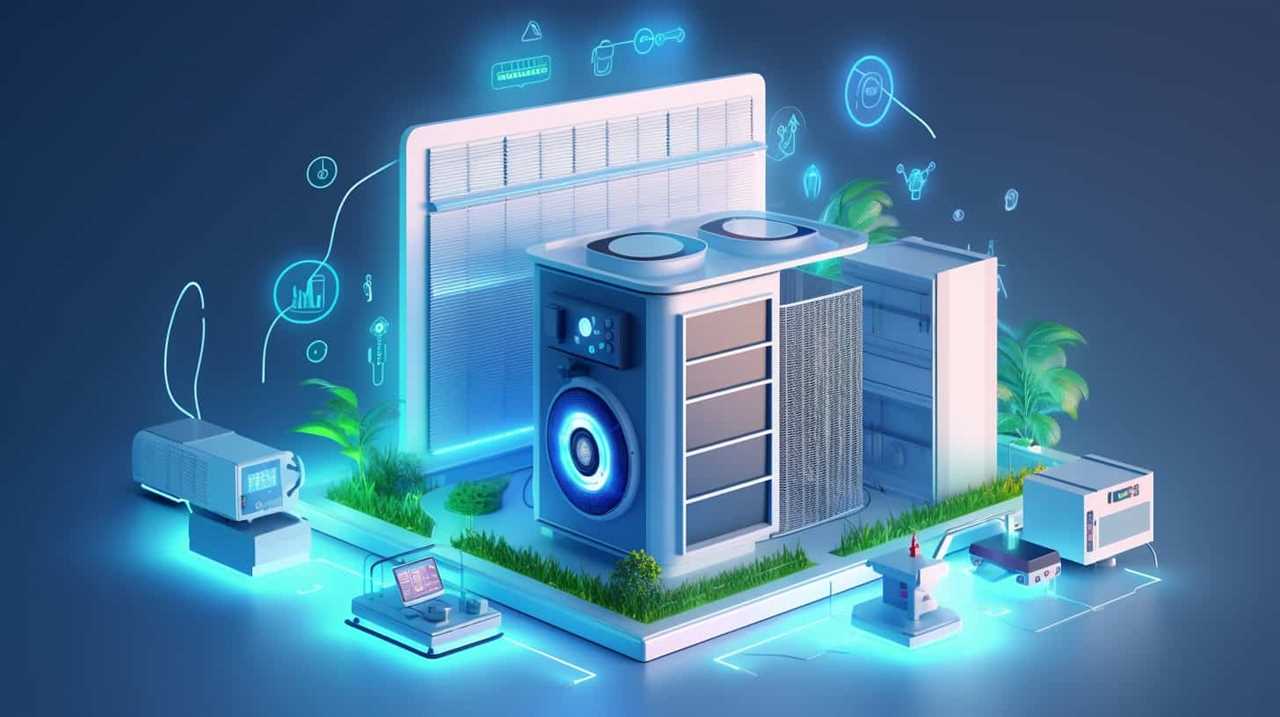
Is Regular Maintenance Necessary for HVAC Heat Pump Efficiency, and if So, How Often Should It Be Done?
Regular maintenance is crucial for HVAC heat pump efficiency. Neglecting it can significantly impact performance. To ensure longevity, we recommend scheduling maintenance regularly. Don’t underestimate the importance of this vital step in optimizing your system.
Are There Any Advanced Technologies Available That Can Further Boost the Efficiency of HVAC Heat Pumps, and How Do They Work?
Yes, there are advanced technologies available that can further boost the efficiency of HVAC heat pumps. These technologies work by optimizing energy usage, improving heat transfer, and incorporating smart controls for optimal performance.
What Are Some Insider Secrets to Maximize the Efficiency of Heat Pumps in HVAC Systems?
Maximizing heat pump efficiency secrets can significantly improve the performance of HVAC systems. Regular maintenance, such as cleaning or replacing air filters, ensures unrestricted airflow and optimal heat transfer. Properly insulating ductwork and sealing gaps reduce energy loss. Setting the thermostat at an appropriate temperature and using programmable features can avoid unnecessary energy consumption. Moreover, scheduling professional check-ups and considering upgrades or eco-friendly refrigerants can further enhance heat pump efficiency.
Conclusion
In conclusion, the efficiency secrets of HVAC heat pumps lie in proper insulation, optimized airflow, selecting the right size heat pump, regular maintenance, and advanced technologies.
These factors work together to enhance performance and maximize efficiency. Just like a well-oiled machine, a well-maintained HVAC heat pump operates smoothly and effectively, providing optimal heating and cooling while minimizing energy consumption.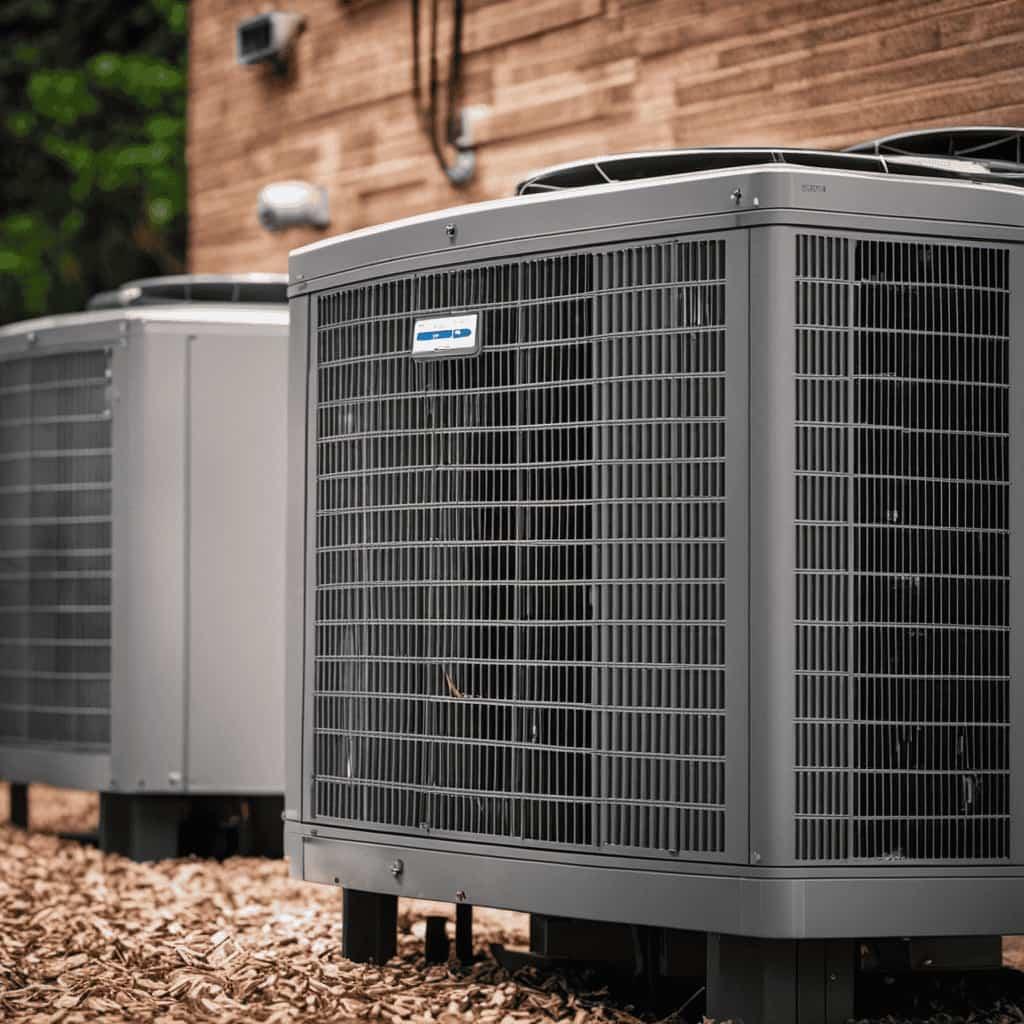
It’s like having a sleek, high-performance sports car that effortlessly glides through any climate.
Climate Control
Are Your Heat Pumps Energy-Efficient? Test With These Tips

Is your **heat pump** truly as energy-efficient as it claims to be? Test its efficiency with the help of these tricks. If you want to save money and reduce your energy consumption, this is the perfect opportunity to see if your **heat pump** is really doing its job. Keep reading to find out more!
We’ll break down heat pump efficiency ratings, explore proper sizing for optimal energy efficiency, and share maintenance tricks to maximize their performance.
Plus, we’ll dive into smart thermostat integration and programming tips, as well as energy-saving strategies for operating your heat pump.
Get ready to unlock the full potential of your heat pumps and enjoy the freedom of lower energy bills.
Key Takeaways
- Efficiency ratings (SEER and HSPF) determine if heat pumps are energy-efficient.
- Proper sizing and regular maintenance maximize energy savings.
- Integration of smart thermostats and programming can improve efficiency.
- Implementing energy-saving strategies such as proper installation, temperature control, and zoning can optimize heat pump operation.
Understanding Heat Pump Efficiency Ratings
We need to understand the efficiency ratings of our heat pumps to determine if they’re energy-efficient. With recent advancements in heat pump technology, there are now more energy-efficient models available on the market.
To compare the energy efficiency of different heat pump models, we can look at their efficiency ratings. These ratings are measured using a metric called the Seasonal Energy Efficiency Ratio (SEER) for cooling and the Heating Seasonal Performance Factor (HSPF) for heating. The higher the SEER or HSPF rating, the more energy-efficient the heat pump is.
When comparing energy-efficient heat pump models, it’s important to consider both the SEER and HSPF ratings to ensure that you’re making an informed decision. By understanding these efficiency ratings, we can choose heat pumps that aren’t only technologically advanced but also energy-efficient.
Proper Sizing for Optimal Energy Efficiency
Our goal is to ensure that our heat pumps are properly sized for optimal energy efficiency. Proper sizing is essential to maximize energy savings and ensure that your heat pump operates efficiently. Here are some energy saving tips to consider when it comes to proper sizing:
Consider the size of your home: The square footage of your home plays a crucial role in determining the size of the heat pump you need. A heat pump that’s too small will struggle to heat or cool your home effectively, while one that’s too large will cycle on and off frequently, wasting energy.
Insulation and air sealing: Proper insulation and air sealing are important factors affecting efficiency. Ensuring that your home is well-insulated and air sealed will help prevent heat loss or gain, allowing your heat pump to work more efficiently.
Ductwork: Properly sized and sealed ductwork is crucial for efficient heat pump operation. Leaky or improperly sized ducts can result in energy loss and reduced efficiency.
By considering these factors, you can ensure that your heat pump is properly sized for optimal energy efficiency.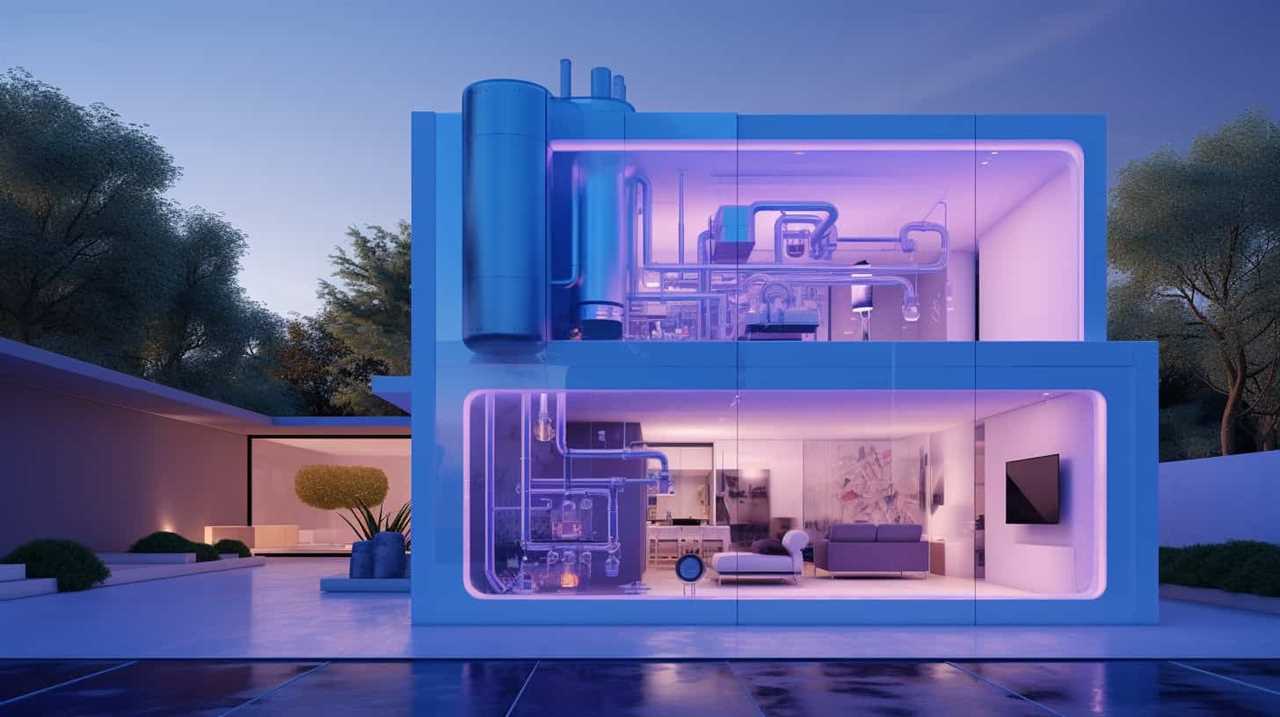
Now let’s move on to the next section, where we discuss regular maintenance to maximize efficiency.
Regular Maintenance to Maximize Efficiency
To ensure maximum efficiency, we should regularly maintain our heat pumps with proper cleaning and inspections. By following a maintenance checklist, we can keep our heat pumps running smoothly and avoid costly repairs.
First, it’s important to clean or replace air filters every one to three months. Clogged filters restrict airflow and reduce efficiency.
Next, we should inspect the outdoor unit for any debris or vegetation that may obstruct airflow. Additionally, we should check the thermostat settings to ensure they’re accurate and adjust them as needed.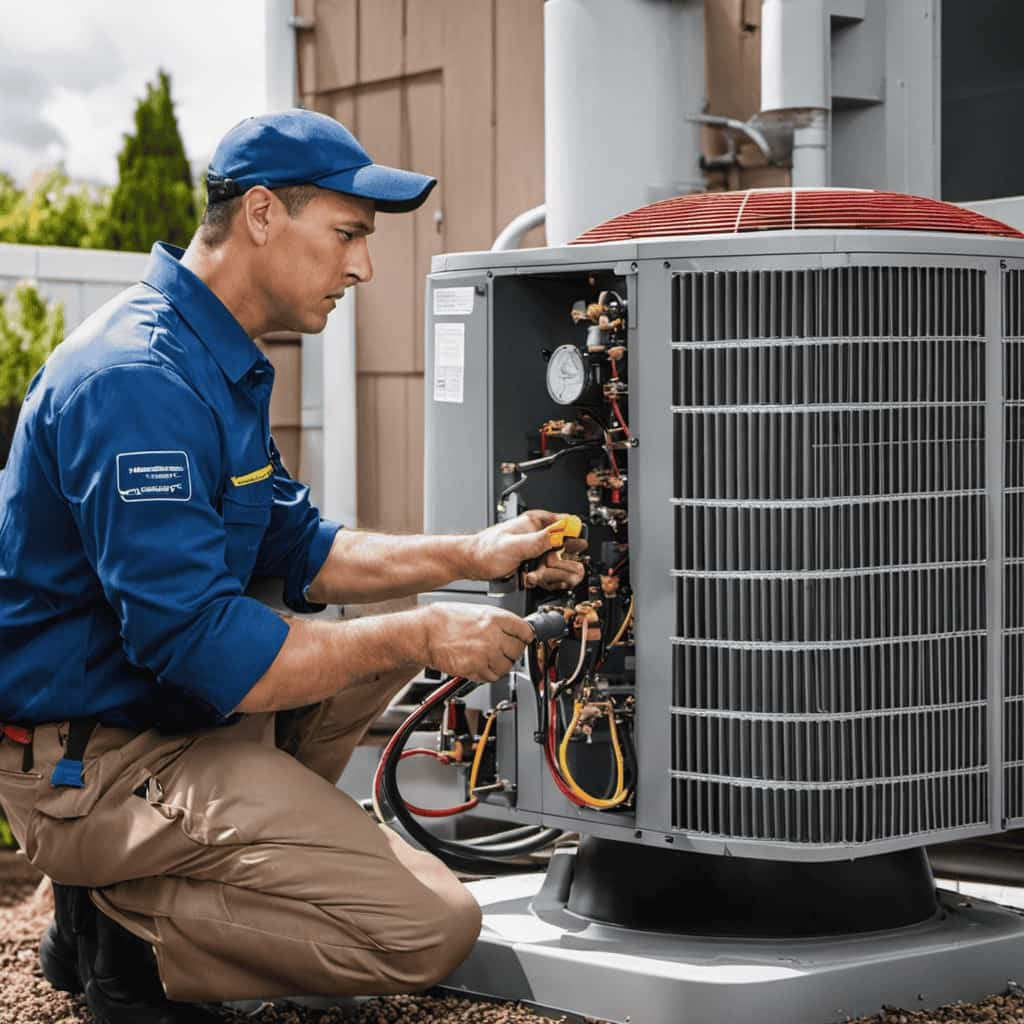
Troubleshooting tips include checking for any unusual noises, leaks, or inadequate heating or cooling performance.
Regular maintenance not only maximizes efficiency but also extends the lifespan of our heat pumps, saving us money in the long run.
Smart Thermostat Integration and Programming Tips
One key tip for integrating and programming smart thermostats is to set a schedule with specific temperature adjustments throughout the day. This allows you to maximize energy efficiency by only using heating or cooling when necessary. Smart thermostats offer a range of energy-saving features to help you achieve this goal.
Here are some tips on how to program your smart thermostat for maximum energy efficiency:
- Take advantage of the thermostat’s learning capabilities by allowing it to adapt to your schedule and preferences.
- Utilize the geofencing feature, which uses your smartphone’s location to adjust the temperature when you’re away from home.
- Use the energy-saving mode, which automatically adjusts the temperature to save energy when you’re not at home.
By programming your smart thermostat effectively, you can reduce energy waste and save money on your heating and cooling bills.
Now, let’s explore energy-saving strategies for heat pump operation.
Energy-Saving Strategies for Heat Pump Operation
To maximize energy efficiency, we can implement various strategies for operating heat pumps.
One important strategy is to ensure proper heat pump installation. This includes proper sizing and positioning of the unit, as well as ensuring proper insulation and sealing of ductwork.
Another energy-saving tip is to set the thermostat to the most energy-efficient temperature. For heating, setting the thermostat between 18-20 degrees Celsius (64-68 degrees Fahrenheit) is recommended, while for cooling, setting it between 24-26 degrees Celsius (75-78 degrees Fahrenheit) is ideal.
Additionally, it’s important to regularly clean or replace air filters to ensure optimal airflow and energy efficiency.
Finally, using a programmable or smart thermostat can help optimize energy usage by automatically adjusting temperature settings based on your schedule and preferences.
Frequently Asked Questions
How Do I Know if My Heat Pump Is Energy-Efficient?
We can determine if our heat pump is energy-efficient by considering factors such as improving insulation and the benefits of regular servicing. This helps us make informed choices and achieve energy savings.
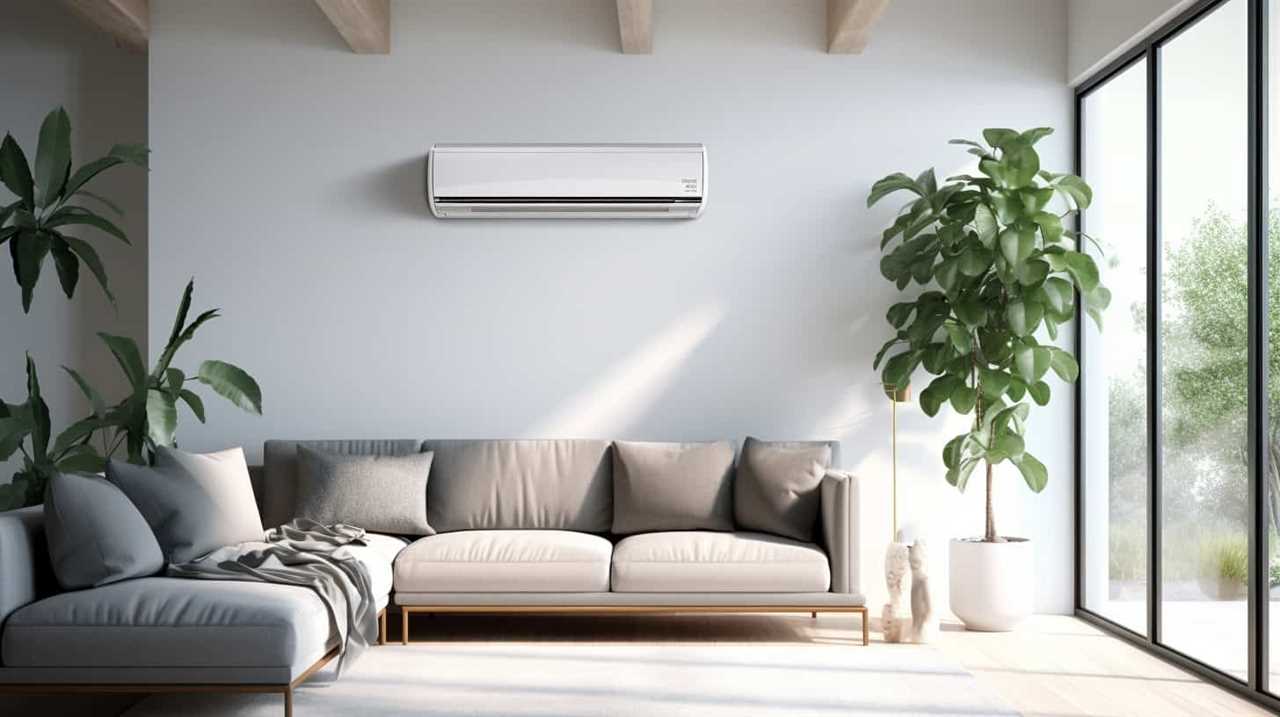
Can I Still Achieve Energy Efficiency With a Heat Pump That Is Not Properly Sized for My Home?
Yes, you can still achieve energy efficiency with a heat pump that is not properly sized for your home. However, it may not operate as efficiently as a properly sized one, leading to higher energy consumption and costs.
What Are Some Common Maintenance Tasks That Can Help Maximize the Efficiency of My Heat Pump?
Heat pump maintenance is essential for maximizing efficiency. Regularly clean or replace air filters, clear debris from outdoor units, and schedule professional inspections. These tips can help ensure our heat pumps operate at peak energy efficiency.
Are There Any Specific Tips for Integrating a Smart Thermostat With a Heat Pump for Optimal Energy Efficiency?
Integrating a smart thermostat with our heat pumps can optimize energy efficiency. We can save more by utilizing energy-saving features such as programmable schedules, remote access, and smart algorithms that adapt to our preferences.
Besides Regular Maintenance and Smart Thermostat Integration, What Other Strategies Can I Adopt to Save Energy While Operating My Heat Pump?
Energy saving habits, such as setting a programmable thermostat and keeping the temperature moderate, can help save energy when operating heat pumps. Additionally, proper insulation techniques can prevent energy loss and increase efficiency.
What Are the Secrets to Ensuring Optimal Heat Pump Efficiency in Eco-Buildings?
Achieving optimal heat pump efficiency in eco-buildings requires a multi-faceted approach. Firstly, proper insulation and airtight construction minimize heat loss or infiltration. Secondly, regular maintenance and clean air filters ensure optimal heat exchange and airflow. Lastly, employing smart thermostat systems that optimize temperature settings and take advantage of renewable energy sources further enhance heat pump efficiency in eco-buildings.
Conclusion
In conclusion, understanding and maximizing the efficiency of your heat pump is crucial for saving energy and reducing costs.
By considering heat pump efficiency ratings, sizing, regular maintenance, and integrating a smart thermostat, you can optimize its performance.
Implementing energy-saving strategies will also help to ensure your heat pump operates at its best.
So, take control of your energy usage and let your heat pump work smarter, not harder, to keep you comfortable all year round.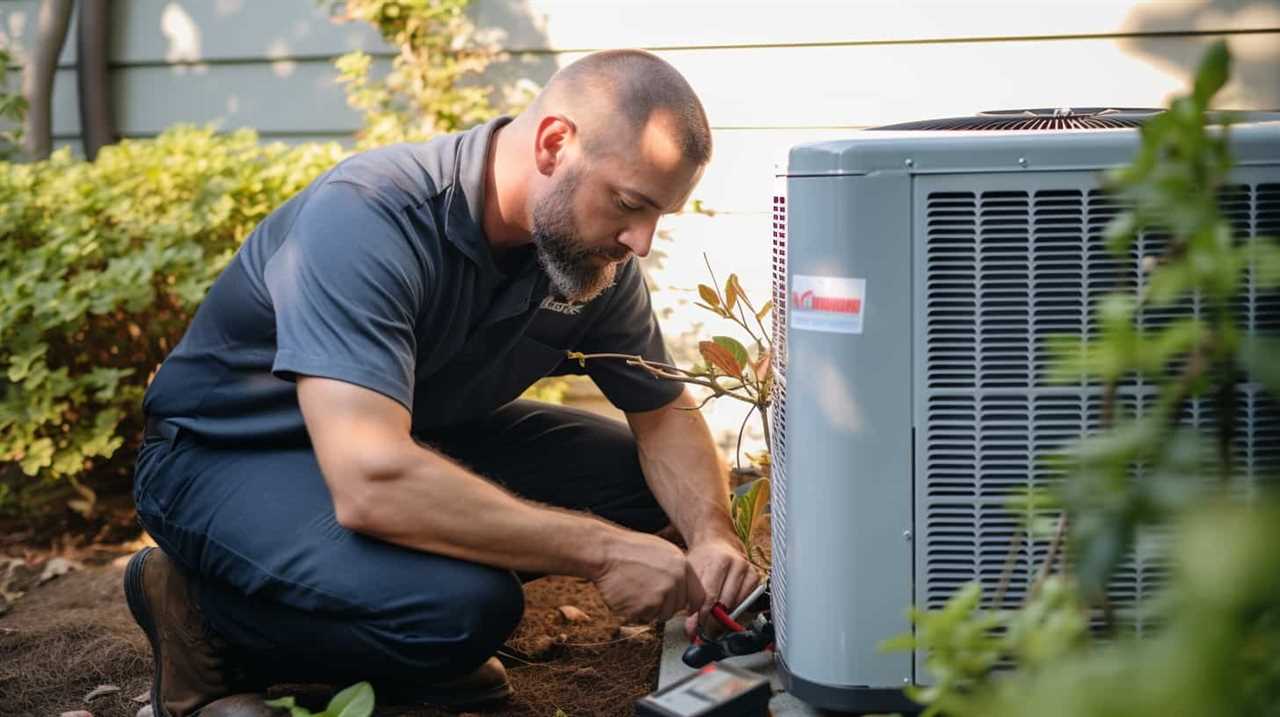
-

 Residential and Commercial Applications3 months ago
Residential and Commercial Applications3 months agoBest Amana Heat Pump Reviews
-

 Thermal Energy Transfer3 months ago
Thermal Energy Transfer3 months agoBreakthroughs in Modern Heat Pump Systems: Thermal Energy Edition
-

 Residential and Commercial Applications3 months ago
Residential and Commercial Applications3 months agoBest Heat Pump
-

 Geothermal Heat Pumps2 months ago
Geothermal Heat Pumps2 months agoUpgrade Your Comfort with Our Efficient HVAC Systems
-

 Geothermal Heat Pumps2 months ago
Geothermal Heat Pumps2 months agoInnovative Geothermal Heat Pump Manufacturers Revolutionize Energy Efficiency
-

 Air Conditioning4 weeks ago
Air Conditioning4 weeks agoExploring Energy-Efficient Air Conditioning Heat Pumps
-

 Thermal Energy Transfer3 months ago
Thermal Energy Transfer3 months agoBoost Your Heat Pump Efficiency: Interactive Guide
-

 Residential and Commercial Applications3 months ago
Residential and Commercial Applications3 months agoBest Portable Heat Pump Heat & AC











